#at one point he was even like ‘but that’s not a very Christian solution’
Explore tagged Tumblr posts
Text
I always hear horror stories about school therapists but mine was a really nice one. I spent the last ten minutes talking about issues unrelated to school and she asked if she could hug me at the end, really nice woman :]
#oh also I confessed to a frier in camp grounds#before the school therapist I was sent to the help Center#I knew he was a religion teacher going in#and I knew he was a frier going out#surprisingly chill tho even tho the advice was as good as you can imagine it was#at one point he was even like ‘but that’s not a very Christian solution’#OH AT ANOTHER POINT HE WAS LIKE ‘but you’re water you can’t act as if you were wine’ YOU LITERALLY BELIEVE JC DID THAT#anyways I want you to guess#between the nice therapist lady and the help Center frier guy#who I told I was gay to#yea#but hey he was super chill#great guy really just not the best. for the help Center.#felt like I was going in for confession
3 notes
·
View notes
Text
Glass Cuts Deepest (10)
[ professor! • Aemond x student! • female ]
[ warnings: kissing, panic attack, mention of rape, fluff, angst, indecent student-teacher relationship ]
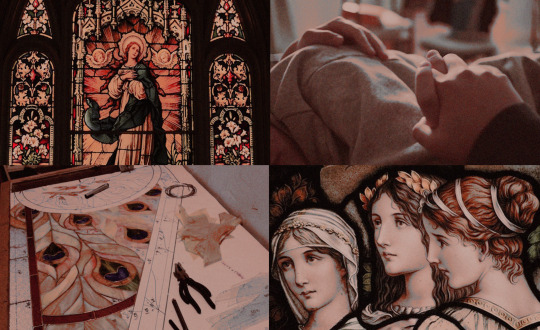
[ description: A female painting student is finally able to choose the specialisation she has dreamt of - stained glass. She wants to become a student of the best specialist in this field, but he, for some reason, refuses to accept female students into his workshop. She finds out that he once slapped a female student of one of the other professors. Nevertheless, she makes an attempt to find out what happened then and to convince him to teach her. Slow burn, sexual tension, dark, agressive Aemond, great childhood traumas. ]
* English is not my first language. Please, do not repost. Enjoy! *
Previous and next chapters: Masterlist
_____
He had never felt as calm and happy as he did that morning when he returned to his room − he couldn't get rid of the smile of pride and satisfaction at the thought that he had touched her, that he had brought her to orgasm with his very words, kisses and the touch of his hand.
He could still hear her surprised sobs of pleasure as fulfilment shook her body, as she sought refuge in his arms.
She was so polite and obedient, keeping her hands where he told her to, even though he knew it was difficult for her, she didn't touch him, allowing him to focus entirely on her and her pleasure.
He had never touched a woman of his own volition before her.
He wondered how it had come so easily, practically effortlessly, and realised that he had not associated this type of touch with Alys.
When she came to him then it wasn't him touching her, she was the one touching him, she was the one in control.
However, Wright then gave herself completely to him, allowing him to touch her as he wished, still clothed without making him feel threatened.
He realised that this could have been the solution to his problem, that maybe when he was the one in control of what was happening, his body wouldn't react with panic and bring up those awful memories.
When they went to the church to see how the installed stained glass windows looked like he felt a kind of pride, seeing how the golden background around the Mother of God with the child shimmered in the sunlight, giving a truly heavenly impression.
He couldn't look away from the face he had painted, simultaneously embarrassed and delighted by the sight, realising something, interjecting a word from the bishop who had just praised his student's project.
"In Christian iconography and theology, the Virgin Mary is supposed to be the personification of the New Eve, transformed from a woman who was tempted into a woman who contributed to human salvation. Her son, Christ, was instead to be the new Adam, which is why often in crucifixion paintings we see a skull under his feet on the ground that is meant to symbolise Adam's tomb, on which his cross grows like a tree." He said calmly, pretending that he just wanted to add some interesting information on the subject, but when he glanced at Wright he saw her lower her gaze quickly, trying to hide the smile of embarrassment and the redness of her cheeks.
He knew he was talking about her.
She was his Eve.
She was his salvation.
He had fallen in love with her.
"Indeed, the professor is right, Our Lady and Christ are the announcement of a new paradise, but also of the good news that the exile and wandering of mankind is over, that the gates of heaven have been opened to them again." Said the bishop in a light tone, acknowledging his point, snapping him out of his reverie with his next question.
"Who painted the face of that wondrous Mother of God that shines so luminously before us?"
He looked at him in surprise, feeling his heart pounding fast, and grunted quietly, not wanting to show his sudden nervousness.
"Me." He said indifferently and dryly, standing with his hands folded in front of him, and then he saw the priest's gaze quickly shift to his female student. He felt a tightening in his throat, knowing that he already knew.
Fuck.
Was Cregan guessing too, or was he just pretending not to see it?
How could he have been so stupid to let this happen?
He swallowed loudly, glancing at Wright and felt a cool sweat on the back of his neck noticing how she had gone pale, not a trace of her joy and contentment from a second ago.
She didn't look at him.
Not when they left, not when they drove back to the hotel, not when Cregan suggested they celebrate her success with dinner. He was willing to do it, he was proud of her, but she just said thank you, smiling sadly, and said she was tired and would go to her room now.
She was heartbroken and it was his fault.
As soon as he had showered and changed he was immediately outside her balcony door, knocking on her window, devastated at the thought that she might not want to see him anymore, that he had screwed things up so badly.
He was relieved when he heard movement on the other side, and then the door opened. He saw the look on her face, sadness, tiredness and resignation, and felt a tightness in his throat. He closed the door behind him, looking at her, all tense.
"What's going on?" He asked immediately, feeling like his heart was about to jump out of his chest, his breathing uneven and accelerated.
He felt even worse when he saw that she looked away and pressed her lips together, clearly feeling uncomfortable that she wanted to tell him something that might hurt him.
"He knows. He knows it was my face you gave to your Virgin Mary." She muttered in despair and took a step back as he moved towards her. She didn't move away when he grabbed the nape of her neck and pressed his forehead against hers, shushing her silently as he traced the skin of her warm cheek with the fingers of his other hand.
"− shhh −" He whispered, hearing her accelerated breathing, seeing her look on the verge of crying, feeling painfully remorseful that he had put them at risk himself.
He didn't know then what would happen, didn't know he could ever have her.
"− it won't work − someone will catch us − we won't hide −" She whispered in a breaking voice, tear after tear running down her cheek.
He felt a sting in his heart at the thought that she was terrified, that she had realised what a threat this was if someone caught them. He pressed his lips together, knowing that he was the one who had the least to lose, that he was finished anyway, that he wanted to leave anyway, but she was going to study there for three more years.
He didn't want anyone to think that she owed her place and victory in the competition to the fact that she was warming his bed.
Helpless, he hushed her once more, drawing her to him, embracing her with his arms and cuddling her into his chest. She clung to him immediately, placing her hands on his t-shirt just as he had shown her the day before, hugging her cheek to his torso, breathing raggedly through her cry.
"Just tell me if you want to try." He whispered, stroking her hair and back in a calm, slow motion. He felt her freeze, her breathing sped up − she herself no longer knew what she wanted and the thought was breaking his heart.
"I'm scared." She whispered in a trembling voice. He grasped her cheeks gently in his hand and lifted her face to look at him.
"I'm scared too, but that's not what I asked you." He said calmly, looking at her tenderly.
He was scared too.
He had been scared all his life.
But he wanted to try.
He could see that she didn't know what to say, that she was heartbroken and terrified, that she needed comfort and reassurance that he wouldn't leave her, that he wouldn't expose her to mockery and gossip, that he would protect and care for her, that he wouldn't treat her like a pretty toy that he would abandon as soon as he got bored.
He felt that he had to explain to her how he felt about her, that he had to somehow put into words why it was all so important to him, why she was precious to him, why he needed her so much.
"I don't know if you believe in God, but I do. Despite what has happened to me, I believe in him and that he is merciful. I also believe that he put you in my path, that he made me choose you because you are his gift, that he knows neither of us wants to do anything bad. I have never had the opportunity to care or look after anyone before in my life, but I want to do so for you. My sketches, your face that I painted, was an expression of my desperation and suffering, but this is the last time I let anyone see what I feel for you. This is the last time I put you in danger." He whispered in a trembling voice, tucking an unruly strand of her hair behind her ear in a tender, soft gesture, literally letting out his thoughts, his feelings.
Despite what had happened to him, he was a person of faith, attending church and praying.
His faith was instilled in him by his mother, taking him to church with her every Sunday. Aegon and Helaena did not want to go there, but he did. At first, it was because he had her all to himself then, that it was their time, that he was then her only child to whom she gave her attention.
But then he began to find some kind of relief in this, in the thought that his suffering was not worthless, that it had some meaning, that he may not have had a good father on earth, but he had one in heaven.
Seeing his suffering and loneliness, he sent him, like to Adam in Eden, his Eve, so that he would no longer be lonely, and with her he sent him that wonderful feeling that had to come from him, because it was too beautiful, too warm, too good.
He saw her draw in the air loudly at his words, her gaze warm and tender, filled with pain and affection at the same time, from which he felt tears under his eyelids.
"Please, protect me." She mumbled at last, and he sighed loudly in relief and smiled tenderly, stroking her cheeks.
"I'll. I promise." He whispered, feeling heat filling his heart at the thought that she trusted him, that she believed he was capable of it, that his feelings for her were sincere.
They leaned towards each other tentatively and then their lips came together in a hot, wet kiss that made his head spin, her scent and taste filling all his senses making him feel throbbing in his sweatpants again.
After what had happened the day before, he felt more confident.
He thought he wanted to do it.
"− do you want to finish what we started yesterday? −" He asked quietly and she nodded, smiling so sweetly, so innocently, that he felt like devouring her.
They kissed again, deeper and more passionately, and then he took her hand in his, leading her slowly towards her bed, sitting down on it, looking up at her from below.
She stood before him, beautiful and warm, just his, and he had all night to explore her body.
He bit his lower lip feeling the painfully pleasurable pulsing of his manhood again, pleased with how automatically his body responded to her closeness.
"Can I stroke your cheek?" She asked uncertainly and he swallowed loudly, looking at her surprised.
You are such a pretty boy, Aemond.
He wasn't sure if he wanted it or not, but he thought it was just a touch on the cheek, no big deal − he knew how warm and soft her hands were and he decided he wanted to feel her.
So he nodded and swallowed loudly, closing his eyes, pressing his lips together because as soon as he felt her touch, he saw her, pulling off her nightshirt, a shapely, ripe body that might as well have belonged to his mother.
He saw her large breasts, her wide hips, her womb.
Why are you so tense?
"Are you okay?" He heard another soft, warm voice and nodded, figuring he could stand it, that she wasn't doing anything wrong after all, that she was just touching his fucking cheek.
But instead of her hand, he felt her hand, her hand stroking him as she rode him, as her body fell against his manhood with a loud, sickening click, and she panted in delight.
Look, see?
You wouldn't be so hard if you didn't want it.
It's okay, sweetheart.
He felt tears under his eyelids, pressed his lips together and shook his head, grabbing her wrist.
"− no − I − I'm not − I'm sorry −" He mumbled out brokenly and felt her pull away from him immediately, but he was no longer there, with her − he was in his hotel room there, during their family trip to the seaside, he was alone in his bed when she came to him and refused to leave his mind, his heart, his body.
It wasn't better at all.
Nothing was better.
Nothing had changed.
He couldn't not think about it.
He burst out sobbing, heartbroken by this discovery, by the realisation that he could only touch but not be touched, that the physical tenderness of the girl he adored was unwanted to him, made him uncomfortable, made him want to run away. He couldn't cope with that thought, that terrifying realisation that this would probably never change.
That forever again the touch of her hand on his bare cheek, his arms or his torso would remind him of her.
That he would never let her touch him down there because it would remind him of her.
That he might not even be able to look at her beautiful, gorgeous naked body because it would remind him of her.
He wanted to die.
"− I'm begging you, don't apologise − I'm the one who's sorry − so much has happened, I shouldn't have asked for this − forgive me, I didn't mean to hurt you −" Her terrified, distraught voice roused him from his lethargy. He chuckled despairingly under his breath, revealing his face to her, shaking his head.
"− hurt me? − you can't even touch me − fuck! −" He growled in despair through his tears, running his hand over his face, feeling his whole stomach clench, his body quivering, knowing it was a panic attack again and that she had just witnessed it, that after what she had seen she would understand what she was dealing with, how fucked up he was.
She couldn't even touch his fucking cheek because he was starting to shake and cry.
How were they going to have a normal relationship?
How could he make her persist in something like this, feeling perpetually rejected and unwanted?
He thought it was all her fault, that stupid whore − he felt anger and hatred, words began to fly out of his mouth on their own, the things he had never told anyone about gushed out of him like the poison that had bubbled up inside him all these years.
"− that whore − then when she came to me − she touched me, she fucking touched me everywhere − my cheeks, my shoulders, my chest, my stomach, my −" He couldn't finish, gasping for air, his voice breaking through the fact that he was crying and couldn't breathe, looking at her, seeing her terrified, hot gaze full of concern and understanding.
She was listening to him, she was beside him, kneeling on the ground beside him like Mary Magdalene beside Christ, not daring to touch him.
He drew in a loud breath and raised his hand, as if he wanted to explain something to her, to point out the source of the whole problem.
"− she touched me everywhere − e v e r y w h e r e − as if she wanted to contaminate my body − to make sure that no one would ever touch me after her again −" He muttered in a breaking, angry, embittered voice, running his hands through his hair, only now understanding what she had done to him, how much she had deconstructed him as a person.
For years he had told himself that he simply hated women and didn't need them, that he was capable of satisfying all his needs himself, but now he realised that this wasn't true, that he was protecting himself this way from disappointment, that subconsciously he knew he wouldn't be able to bear the touch of anyone else.
He saw her cover her mouth with her hand, crying as he did, her eyebrows arched in anguish, in disbelief, the pain in her eyes from which his own heart squeezed.
"− she destroyed me as a man − as a boy − you were right − it doesn't make sense − you don't deserve this, you will only face rejection from me −" He muttered, burying his face in his hands again, heartbroken at the thought that he hadn't been able to give her what she needed, that he would never change, that he would never be normal again, that what had happened to him couldn't be fixed.
He felt worse and worse, he felt the contents of his breakfast in his throat, his heart was pounding so hard he felt like he was about to die, he was shivering all over, cold sweat running down his back.
"− you said you would never touch a woman before me, and yet you've been sleeping in the same bed with me for the past two nights − you've been holding my hand and kissing me − you demand too much of yourself and you think I demand the same, but that's not true − I just want you to be there for me −" She said in a quick, breaking, soft voice from which he felt warmth in his chest − he drew in air loudly, clinging to her words, wanting to believe her, wanting to hope.
And then he felt a contraction in his stomach.
He knew what it meant.
His body had always reacted the same way since that evening.
"− I − I − I think I'm about to throw up −" He mumbled and heard her pick herself up quickly, running somewhere, taking a moment to hand him the vase.
He just managed to turn away from her, not wanting him to look at it, and threw up, trembling all over, breathing loudly, embarrassed, humiliated, weak and distraught, feeling that he had just shown her his worst side, the one he was most ashamed of.
He thought that after something like this she would never want him again.
That she would only be with him out of compassion.
"− I'll stay with you − I'll take my duvet, we'll go to your room and I'll lie down on the armchair next to you − I'll be with you, okay? −" She whispered in a trembling voice, and he felt a tightening in his heart at the thought that his guess had come true, that she felt sorry for him, that she would now feel responsible for him like a mother for her child rather than a woman for her man.
Still, he needed her like he had never needed anyone else in his life, so he nodded.
He rinsed his mouth and the vase in her bathroom, not even looking at his reflection in the mirror out of shame, unable to believe that he had got a panic attack because she had touched his cheek.
He left her room without a word.
He only checked that they had both closed the door behind them and lay down on his bed, feeling completely lifeless, weak and resigned.
Empty.
He saw her sprawled in an armchair near his bed covering herself with a duvet and thought it was pathetic that he, as a man, was supposed to sleep here and she was supposed to lie there in discomfort and watch him as if he were six years old.
He stood up abruptly, frustrated by this thought, walking over to her.
"− you'll be uncomfortable there − lie on the bed, I'll sleep in the armchair −" He said indifferently, but she furrowed her brow and shook her head, covering herself more tightly.
"− no −" She said in a tone that he knew wouldn't convince her, and he no longer had the strength to argue with her.
"− come to bed −" He whispered resignedly, going back and laying down on the bedding. He heard her objection caused by fear that she would make him uncomfortable again, but he interrupted her in mid-sentence by saying that he wanted her close to him.
After a moment, she stood up uncertainly, circling his bed, and he felt the mattress bend under the weight of her body, which lay somewhere far away from him.
He swallowed loudly, feeling shame and sadness, thinking about how he would never be a man again in her eyes, how pathetic he was. He felt tears under his eyelids again and cried like a small child, clenching his lips, not letting any sound leave his throat. He swallowed loudly, drawing in air deeply.
"− will you stroke my head? −" He asked in a breaking voice, remembering that when he was a little boy and was afraid of darkness, his mother would come to him and stroke his head until he fell asleep.
"− I don't want to hurt you again −" She whispered uncertainly, and he felt a tightening in his heart at the thought that she clearly resented herself for wanting to touch him, as if touching his cheek would be some perverted crime.
He squeezed his eyes shut, swallowing loudly, feeling his body tremble, having the feeling that he was cold.
"− please −"
He heard her shift, moving closer but so that her body wasn't touching his, and after a moment he felt her tiny fingers comb through his hair in a soft, calm motion. He felt a pleasant shudder, some kind of reassurance at that familiar, longed-for touch that combined his pleasant memory with her scent and touch.
He heard her want to say something, sensitive to any movement of his, but he didn't let her.
"− don't stop −"
So she continued stroking him, with an unhurried, tender movement of her hand trailing over his head, playing with his short hair making him finally start to calm down, his heart no longer pounding so fast, his breathing no longer so loud.
"− I will watch over you all night − no one will come in here − no one will touch you − you are safe − try to sleep −" She whispered tenderly with a certainty that surprised him − he felt a sudden tightness in his throat, one solitary tear ran down his cheek at her words.
No one will come in here.
No one will touch you.
You are safe.
He hadn't even realised how much he needed to hear it.
He sighed quietly, feeling some kind of relief, as if her reassurance had made his whole body relax.
He believed her.
No one would come in here.
No one would touch him.
He was safe with her.
He closed his eyes, concentrating only on the tender, gentle, feel-good touch of her fingers, on the smell of her body and her shampoo, on the fact that he could feel her breath on his neck.
She was beside him.
He slept restlessly and shuddered every time he woke up feeling her touch, terrified, but as soon as he turned his face towards her and saw her lying next to him immediately felt indescribably relieved.
In the morning, turning around and noticing that she really was awake, that at his slightest movement she opened her eyes and her hand began to stroke him again, he felt a squeeze in his heart.
"− sleep −" He whispered quietly, but she only smiled softly and shook her head as if she was happy to be with him. He felt hot in his heart, felt the need to touch her.
"− embrace me − I want to feel you close −" He murmured, moving closer to her, and she put her arm around him, lifting herself a little higher, pressing her cheek to the top of his head, brushing his hair. He murmured contentedly, snuggling his face into the hollow of her neck, his nostrils filled with her wonderful, longed-for scent.
He slept a stony sleep for the next few hours.
A knock on the door woke them and they both shuddered, terrified.
"Aemond, we have to go to breakfast. I knocked on Wright's room, but I think she's still asleep too. Did you guys forget to set your alarm clocks or something?" He asked amused and they looked at each other with big eyes not knowing what to do, he could see that she was afraid to move from her place.
"− you go on your own, I'm almost ready −" He said loud enough for him to hear and Cregan just sighed heavily and said he would wait for them at the restaurant.
He ran a hand over his face as he heard his footsteps moving slowly away, and then he glanced at her. They looked at each other for a long moment without speaking, tenderness, warmth and concern in her gaze.
He touched her cheek and ran his thumb over it − she closed her eyes, cuddling her face into his hand, stroking it with her fingers.
"− come here −" He hummed tenderly, drawing her to him, sinking into her mouth in an innocent, warm, wet kiss that had nothing of sexual desire in it, only pure longing for the closeness of beloved person.
He brushed the tip of his nose against hers and kissed her again, just as tenderly, purring contentedly when her free hand ran through his hair. She pulled away from him, pressing her forehead against his, trailing her fingers along the back of his head.
"Can I do that?" She asked softly, and he snorted at her question.
"You've been doing that all night at my request." He said softly, and she furrowed her brow, stroking him tenderly.
"I prefer to be sure. I don't want my touch to stop being…pleasurable to you." She mumbled, and he ran his thumb over her lips, not wanting her to say more, understanding what she meant.
"Your touch, your presence is the thing I crave most. I fear nothing so much than that you will no longer desire me after what you have seen." He said with a frown, and she shook her head hurriedly, kissing him quickly and lightly, looking at him again as if she wanted to show him with this gesture that he was completely wrong.
"I've never wanted anyone in my life like I want you."
_____
Aemond Taglist:
(bold means I couldn't tag you)
@its-actually-minicika @notnormalthings-blog @nikstrange @zenka69 @bellaisasleep @k-y-r-a-1 @g-cf2020 @melsunshine @opheliaas-stuff @chainsawsangel @iiamthehybrid @tinykryptonitewerewolf @namoreno @malfoytargaryen @qyburnsghost @aemondsdelight @persephonerinyes @fan-goddess
#aemond fic#aemond fanfiction#aemond targaryen#hotd aemond#aemond x oc#aemond x fem!reader#ewan mitchell#ewan mitchell fanfic#dark aemond smut#dark aemond#dark aemond targaryen#modern aemond angst#dark modern aemond#modern aemond smut#modern aemond#aemond kinslayer#prince aemond#aemond#aemond one eye#aemond the kinslayer#hotd fanfic#aemond fanfic#aemond fluff#aemond fandom#aemond smut#aemond targaryen smut#ewan mitchell smut#ewan mitchell fluff#hotd fluff#aemond targaryen fluff
271 notes
·
View notes
Text
I'm sorry I just cannot believe that 3x22 the savage curtain introduced the dilemma of spock having to choose between following the actual personification of vulcan history and philosophy, or kirk, and then resolved it so quickly that it was barely even a source of stress for either of them. the answer was kirk, btw. in case that wasn't obvious.
SURAK: I will not harm others, Captain.
SPOCK: His convictions are most profound in this matter, Captain.
KIRK: So are mine, Spock. If I believed that there was a peaceful way out of this --
SURAK: The risk will be mine alone. If I fail, you lose nothing. After all, I'm no warrior.
SPOCK: The captain knows that I have fought at his side before and will do so now, if need be. However, I too, am a Vulcan, bred to peace. Let him attempt it.
spock is saying, let him do as he sees fit. let him follow his own principles. and let me stay by your side. kirk tells him to gather weapons in case surak fails, and spock does. he is casting aside the philosophy he was raised with in favour of war, and he's doing it for kirk.
KIRK: Your Surak is a brave man.
SPOCK: Men of peace usually are, Captain. On Vulcan, he is revered as the father of our civilisation. The father image holds much meaning for us.
KIRK: You show emotion, Spock.
SPOCK: I deeply respect what he has accomplished.
KIRK: I hope he accomplishes something here, and soon.
kirk is complimenting surak, and I do think he genuinely means it, but the way he says it comes off like an apology. like he knows what spock just let go of for him, and he wants to make sure spock is okay.
spock says, men of peace, and he is not counting himself as one of them. I think that's what makes kirk look up like that. throughout the show, he does use violence, but outside extreme situations he does it sparingly and elegantly -- the nerve pinch, the simple side step of a punch -- and usually advocates for a more peaceful solution. now, he's admitting how he has changed. he values peace. but he can't call himself an instrument of it.
and now he's comparing surak to a father image. christian implications aside (and that is difficult with star trek sometimes), he is standing beside kirk in spite of surak's and his own vulcan father's teachings, too. he sharpens his spear and looks frustrated with himself. he shows emotion. and he doesn't deny it, either! he says sincerely that he respects surak's accomplishments, and kirk stares at him, because that's more emotion than he generally cares to show, especially after it's pointed out to him. (early in the episode, surak points out his emotion on seeing him, and spock begs forgiveness. he is no longer looking for that from surak. spock has made his choice.)
he's angry at himself. and as a peace offering, kirk says he hopes surak has managed to broker peace here and now. even though you can tell from his tone and the fact that he's still making his own weapon that he isn't optimistic.
(and all of this is putting aside the fact that surak is definitely a jesus figure and spock rejecting his philosophy and forgiveness for an imperfect man is another kind of huge character choice. this has to be pointed out.)
idk how they managed to air this in the 60s. but I'm very glad they did.
#star trek tos#emotional security#star trek#spock#james t kirk#jim kirk#meta#analysis#the savage curtain#3x22 the savage curtain#s3ep22 the savage curtain#tos#the original series#episode#surak
58 notes
·
View notes
Text
Maybe this is just me being a christian in the good omens fandom, but a lot of people say Aziraphale's arc needs to end with him *entirely* dismantling his religious beliefs and stop following God, and I would disagree (I do have religious trauma, so hear me out 💀)
Yes, it was VERY necessary for him to learn that heaven didn't have humanity's best interest at heart. In fact, the archangels are incredibly selfish. Questioning their morals led him to stop armageddon with Crowley. But as the narrator of season one, God is somewhat mysterious, even cheeky ("a dealer who won't tell you the rules, and who smiles all the time"). I don't think we're SUPPOSED to dislike her as a character, but we're meant to question whether heaven is really carrying out her plan.
I often see heaven as the equivalent of a corrupt church; the kind that scares you with hell, says they have power over the bible so you should listen to them, and asks you for donations when they'll probably just spend it on themselves. They're toxic.
Crowley is wise to want to distance himself as much as possible. But I can't say Aziraphale is wrong for wanting to fix it. Heaven existing at ALL isn't the problem, it's the way it's conducted. If they really cared about the earth, they could help people. Crowley saved a girl from killing herself, Aziraphale forgave Maggie's rent, Crowley helped Shakespeare get his plays off the ground, Aziraphale healed Anathema and fixed her bike. Both stopped hell from ending the earth (and heaven orchestrating it). Crowley saved things every time that he was sent to destroy them.
They're constantly doing little miracles, sometimes big ones, while still letting the earth run, where humans can make their own choices and decide what to believe. If heaven was anything like Crowley and Aziraphale, there wouldn't be a system in need of destroying.
I wrote more detailed meta on good omens God here (and my therory on the ineffable plan), but my point is to say that destroying Aziraphale's faith entirely is not the solution. He doubts that heaven is even doing God's work. The end goal for dealing with religious trauma isn't always letting go of your belief in God (that's okay if it is!) but many of us need to deconstruct toxic ideas taught by toxic churches. Some people wouldn't survive without their faith. And FAITH in God isn't the problem, people misrepresenting God in order to devalue, shame, and oppress others for personal gain is.
Given that she canonically exists in the good omens universe, that means that she created everything. She made Aziraphale, Crowley, the universe, the earth, everyone who went on to create anything else, and life itself. Every moment, every place, every feeling, every choice, and every experience was possible because it was created. She's the reason anything that in the history of time was able to happen at all, good or bad.
God may not tell anyone about her plan, but I have a feeling it's going to be the end result of the series, where Crowley and Aziraphale were a part of it (I could be kidding myself, but that's my theory)
The concept of the "sides" being heaven and hell doesn't work without everyone getting a real choice. Neither Crowley or Aziraphale truly belonged to their respective sides because they were morally against them. Just as heaven needs to be fixed, hell shouldn’t be run by *obligation* to do evil. The good omens book said that many demons just considered it their job ("Go up there and make some trouble")
Thinking back to Aziraphale's line, "But humans...get a choice" makes me think that THAT'S what will change.
It's not "this group is nice. go out and do good" and "this group is bad. go out and do evil", it'll be everyone making choices (whether they want to spread misery and destroy the earth, or truly help better the earth and show people the light in a flawed world). Heaven would have a real job of thwarting evil if they weren't the ones administering it, and maybe that's what Aziraphale will try to change.
--
(End of essay personal rant!!)
This is for queer christians especially, I know people forget us. My religious trauma comes from homophobia. I have to remind myself daily that it's not a fault of God, but people. It's PEOPLE who harbor hate for what they don't understand, and many use religion to justify their wanting us not to exist. They fundamentally misunderstand the point of following christ, and others have to work to change that.
It may seem like the best solution is to object to christianity entirely, but I find genuine happiness in it despite the bad eggs. I wouldn't be here if not for it, and it doesn't take brainwashing and manipulation for me to be a follower. I want to be. That's the reason I say any of this; for good omens to end on a positive note with God would mean a lot to queer christians. We're often caught between christians that hate gay people and gay people that hate christians, and it's hard for us to accept both parts of ourselves. Good omens helps me love both :) and thats why I relate to Aziraphale as a character
Also. queer christians and non-christian queer people with religious trauma, you're all so valid and cool, I love you <3
#good omens meta#ineffable plan#god good omens#religious trauma#queer christian#Aziraphale#good omens#good omens season 2#good omens season 3#good omens theory#gay christian#trans christian
145 notes
·
View notes
Text
Codes of Honour and How They Are BS
Screw it, I’m going to talk about codes of honour in Pathfinder and D&D, and the intrinsic problem with them all.
For those who are curious as my background, I’m an English major who has taken some medieval studies classes, and I loved them all. I often get into arguments with a “certain friend” who is often, what feels like, frequently up in arms about alignment and codes of honour. He’s particularly against how Paizo got rid of alignment. This time I’ll be talking about how we look at codes of honour in some of our favourite TTRPG’s and how they are all bullshit.
See, the initial problem with Paladin’s and other classes with codes, is that we have this idea of what chivalry constitutes. But people are mostly wrong about the when of them. The code of chivalry, as it’s often applied in classic Western TTRPGs, goes back to around the 12th and 13th centuries Europe. That part isn’t controversial. The problem is that the only real written code we properly know of dates to 1884 from a French historian named Leon Gautier who read too many medieval romance novels and epics. This is kind of like how the code of Bushido is sort of 11th century, but also 19th century kind of recent. Point being, these codes we have are far, far more romanticized than what they originally were, and what we see them as now is likely not what they were when originally formulated. It’s not just a case of history being written by the victors in the case of Central and South American histories (I can’t/won’t speak of African codes of honour because that’s a huge weakness in my education.) In fact, we have no written records of the actual Code’s of Chivalry and its predecessors, we only have Gautier’s fanfiction. Arguably, these codes date somewhere into Ancient Rome, but that’s a little fuzzier and based on Roman storytelling as opposed to non-romanticized record keeping.
This leads into the second problem. Whose code of honour are we using in TTRPG-land? These European codes of honour are abstract and what we know of are only from, again, poems and epics and modern revisionisms. Cultures from all over the world had codes of honour, and I guess, sure, you can default to European codes of honour for your western-themed game, but that means you’ve fallen into the idea of thinking Europe had one code of honour. Guess you fell for my trap card. Here’s the thing, there are, at the very least in Europe, 5 main codes of chivalry in Europe. I stress “at least.” Loosely, there are the ones from what we know now as the Germanic Tribes, the Frankish Tribes, the British and Welsh, the Italians, and the Saracens. We know of 3 official ones in some random dude’s poem Ordene de chevalerie, and even then, it’s mostly romanticized ideals from the crusades, which, last I checked, wasn’t where a lot of honour was happening. “So Jorm,” you argue, “Then we’ll use the British one because we all speak English in America, right?” Oh yeah, did you know the British one, from what we can gather, either condoned or endorsed slavery, whereas the other European codes explicitly did not? Doesn’t sound much like what a Paladin does, does it? Last I checked everything we come across in TTRPG’s is that Paladins hate tyrants and slavery, so have fun with this argument in the future.
So, this is where I like Paizo’s approach with trying to distance themselves from Christianity and it’s influences in our game worlds. They simply got rid of alignment and the silly line “Act with honour” by instead detailing what rules every deity has (Edicts and Anathema, if you’re curious), and a list for what each kind of Champion stands for. Bang. Done. It’s quite a simple and elegant solution to get past these arguments while also getting rid of that abstract code of honour BS. Sure it’s “More rules”, but honestly, it reduces the number of arguments and lets you get into the meat of gaming.
Anywho, while I would like to continue my rant on this topic, it’s after 3AM and I’ve got a game of Civilization 6 to finish before I sleep.
Jorm of Yore out
14 notes
·
View notes
Note
I’m gonna try and make my point again but on anon bc worried of harassment if Certain People don’t agree.
the christofascist themes in warriors I’ve only been able to notice because they align pretty well with patterns I’ve noticed in my own life. clan life (and starclan) HAS to be the only way for cats. it has to be accepted willingly, or forced upon the “lesser” groups (see, atheist or simply non christian) or they will be destroyed in some way. chased off their own land, killed, assimilated, etc. the clan cats are colonists just like eropean christians. see, squirrelflight’s hope. why does no one challenge the clan’s ideas that they are entitled to land, any land, that would benefit them? even if other cats live there? because they aren’t christia- I mean clan cats so they’re lesser and their lives are expendable. see again, squirrel flight’s hope.
I know the conflict of that book that everyone remembers (other than the abuse apologists and kids who don’t understand) is bramblestar abusing squirrelflight for 464 pages (and then getting her sister killed but he’s a man so it’s okay), but the glaring problem is the author’s bias on people different from them. there was absolutely no reason the only cat loudly protesting the slaughter of expecting mothers and children was the protagonist. and she was treated as though she were in the wrong, and punished over and over again in this book alone. remember they hate squirrelstar and her ideals. heinous, genuinely. and there wasn’t even a good resolution to that! moonlight died! the sisters had to leave! and then helped them in the next arc! what the fuck! anyway
one will note how christians are known to refer to non christians as “wicked” “evil” “dark” “lost” or other terms to make it pretty clear they think less of you for not sharing their faith. the clans the same. even through uncontrollable circumstances such as birth you are shamed in this society and downright humiliated on a good day, attempted murder on a bad one (stormpaw, featherpaw and stonefur)
and the victim mentality the clans have along with the paranoia that they are constantly at risk of being wiped out despite there being like 30 cats in their fucking colonies at all times. there is always a war on christianity. there is always a fight the clans have to win to survive. they always have to kill someone else, lately someone minding their business, to survive. they have to impose themselves on other cultures because they are the True way of life and they never have to be confronted with the idea that they are just as flawed if not more than their counterparts. and if they are, conveniently their opposition is killed off or written to submit later on proving them right. I will not include bloodclan and the kin in this because they were legitimate threats, even if in a way they were also caused by clan culture.
the most glaringly obvious example of why I believe warriors and christofascism overlap outside of the need to force themselves on everyone, is the inability to question anything without severe punishment. you cannot question god without threat of eternal damnation or being ostracized from peers and even attacked. you cannot question starclan without threat of eternal damnation and the same. even when there is no logical solution but to admit that they’re wrong and cruel and just as petty and dangerous as the dark forest, in the end the lesson is that you should listen to starclan, never doubt, never question, or you will be punished. and there is no hope for redemption even if you offer yourself to be used.
that is the issue I have. and it’s a very obvious one that I’m sure I’m not the only one who says something about it, but depending on where you live, I live in southern america, it’s not hard to see parallels. do I think it will ever escalate to the severity of reality? no. probably not ever. but the fact that I can see it is what worries me.
again not very well written, and I even got anxious towards the end so my apologies if it’s hard to follow or too sloppy! just wanted to share my thoughts even if people don’t agree.
This is really interesting, thanks for sharing!! I thought it was pretty illuminating, as I'm someone who's never heard of the term Christofascism. I don't know enough about Christian discourses or the subject at hand to commentate too much unfortunately, but I really appreciate your taking the time to write this out for me. If you're interested in expanding this further, I'd actually recommend looking into some texts on decolonization, as a lot of what you wrote hit on points similar to that (in my opinion of course).
I'm not really the best person to asks for texts like that so I'm gonna link you to communistkenobi's reading recommendations on the subject.
edit: missed it so thank you to cicadaclan for pointing this out but i'd argue against the separation of bloodclan and the kin in this. bloodclan are literally written to be godless outsiders who hate families. the kin are the continuation of the evil outsider intent on destroying the clans. the kin, whether or not they were a threat, still fall into the evil outsider trope.
#sorry for the rbs being off. i'm not comfortable leading this subject#but i think a lot of the texts on the linked posts are important outside of cat analysis (obviously)
23 notes
·
View notes
Text
Roy Harper and Addiction Recovery Models
This is a bit of a weird one. I want to preface with: I have not ever been in addiction recovery. And I’m not here to judge what works for any given individual.
So Alcoholics Anonymous (and Narcotics Anonymous) is probably the most recognizable substance abuse recovery program, certainly in the United States, and possibly in the English-speaking world.
AA is also an abstinence focused recovery program (and as any discussion about abstinence only education regarding ANYTHING will reveal…. Abstinence has some serious limitations) with a heavily Christian background. It pioneered the 12-step program where the goal, to quote the Wikipedia article on AA, “is to effect enough change in the alcoholic's thinking "to bring about recovery from alcoholism" through "an entire psychic change," or spiritual awakening.”
All of this is to get to two main points:
The personal moral deficit implicit in the AA program
The concern about abstinence focused recovery programs
AA has helped people I know and if it has helped you or people you know, that’s awesome — I’m glad it did and I wish you and your loved ones continued health and happiness through whatever programs or choices best support those goals and outcomes.
I’m not sure AA would be the best choice for someone like Roy Harper. Also, I would be interested in seeing a wider range of substance abuse recovery models represented in popular media and/or fan fiction.
AA is based in a very Protestant mindset (the perceived personal moral deficit embedded in the philosophy of the program) where basically one has lost control over their alcohol intake. But if we look at less spiritual and more scientifically oriented views of substance abuse, we see it less of a “loss of control” as a personal failing and more as the result of a variety of factors—genetic, psychological, and bio-chemical. Regardless of which model you apply, the solution usually requires significant changes to lifestyle, habits, and personal conduct. But the method by which we understand and achieve those changes will differ.
Why the heck am I talking about this?
I read a fanfic where Roy had to reset his sobriety to “0” (per the 12-Step model) because he got dosed in fight with a mix of fear-toxin and heroin. The story wasn’t even about that, nor was it really about Roy following the AA program or his recovery or any of that. But I personally had to hit that back button and nope out of there because I was SO ANGRY on Roy’s behalf that he was trapped in a system that declared that the vile actions of OTHERS should set back his personal development.
The complete lack of distinction between “exposure” and “relapse” made me apoplectic.
Now, I imagine that, given that AA chapters are largely self-organized, the specifics of how the 12-Step program philosophy is applied varies a bit from group to group, this depiction of getting set back to “0” is not out of line with the fundamentals of the 12-Step process as I understand it.
(This is leaving aside the questions raised by what the neuro-chemical impact of mixing fear toxin with heroin would be.)
I think it could be really interesting to see a Roy whose heroin addiction recovery program includes the use of methadone. I think we could also spend some time looking into the differences between things like heroin dependency and alcohol dependency (shout out to the changes in N52 that everyone hated!!!) — in many ways alcohol dependence can be a much more dangerous habit to kick (going cold turkey from alcohol can be extremely dangerous in ways that going cold turkey from heroin isn’t. Fun fact!) But also alcohol has been a part of human culture since we first left a jar of fruit in the sun to ferment— and as a major part of the social culture is something that one might prefer to learn to manage or develop a new relationship with rather than simply cutting it out of one’s life completely. (I know some former alcoholics who don’t abstain completely, but I imagine there are certain things they don’t drink and certain context they don’t drink in.)
My point is: Roy Harper is an interesting guy, and I think he could be an avenue for us all to develop more nuanced and varied understandings of addiction and recovery. And I also, personally, don’t think that the AA model would be healthful for his psychology as I understand it.
That having been said, I will end this post on the Serenity Prayer written in the early 1930s and popularized via the YMCA and AA among other organizations. It is something I think of often:
God, give me grace to accept with serenity the things that cannot be changed, / Courage to change the things which should be changed / and the Wisdom to distinguish the one from the other.
(This version does not appear before 1951, but it’s the version I am most familiar with.)
Thank you for coming to my weird rant. Please, take it all with a grain of salt. And with the spirit it is intended, which is mostly to try and encourage people to expand the representations of addiction recovery models because I think that would be cool!
#Roy harper#tw: addiction#tw: alcholism#addiction recovery#dc comics#green arrow#arsenal#red arrow#fanfiction#weird rant
9 notes
·
View notes
Text
When Magneto became Romani

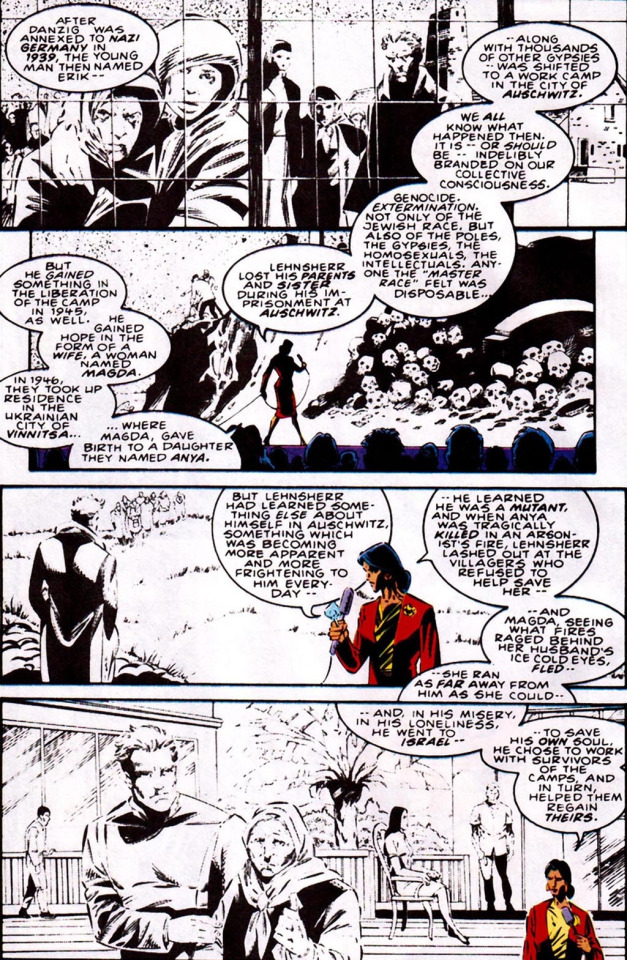
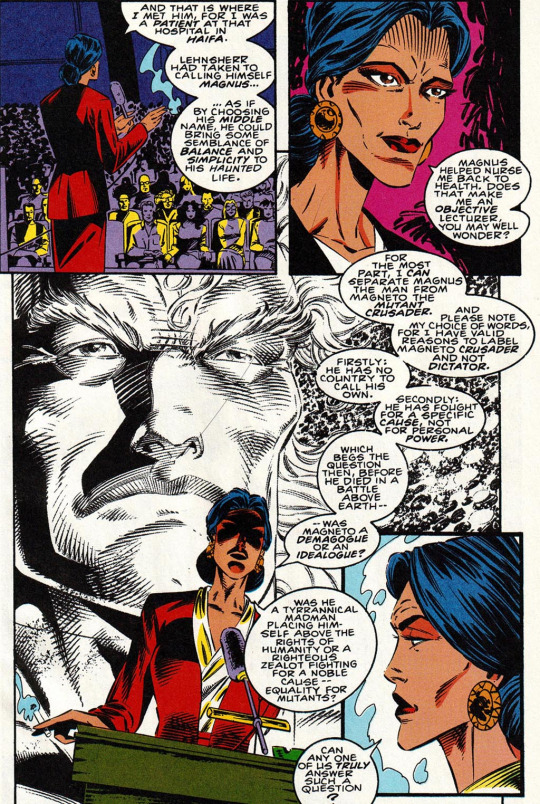
These three pages were included in an X-Men anthology book titled Magneto #0, The Twisting of a Soul by Fabian Nicieza. It was published in 1993 and seems to be the first, or even only place where Magneto's Sinti background is mentioned. This issue is comprised of two short stories about Magneto's background written by Chris Claremont in the 1980's, plus these three additional pages which contradict everything previously written on Magneto's backstory. Unlike the DC universe, Marvel's mainline books are all in the same continuity since the beginning of Marvel Comics in the 60's. Every writer must follow what is established by the ones before. Of course, retcons will happen from time to time, but that's the idea in general. These three pages represent an almost whole-cloth retcon of everything written about Magneto's backstory to this point. For almost 17 years ('75-91), Chris Claremont developed a well defined backstory for Magneto, some of which is included in the very volume that these three pages come from, and Nicieza ignores all of it.
(Content warning for a word that is often considered a slur against the Romani people, I am quoting directly from the text)
Let's examine some of Nicieza's claims:
Pg 1 - "The man who would become Magneto was born Erik Magnus Lehnsherr, to a gypsy family of Sinte desent"
Fact: Magneto is Jewish, which goes completely unmentioned here, and has never before been suggested to be Sinti. I don't know why this author decided to erase his Jewish background and make him Sinti, but nowhere does Nicieza say anything about Magneto's Jewishness, instead casting him solely as Sinti, born to a Sinti family. The illustration even shows him with two pierced ears, an open shirt and a scarf around his neck to drive home the stereotypical "Romani" look.
Also, many Romani people are religiously Catholic/christian.
Pg 2 - "After Danzig was annexed to Nazi Germany in 1939, the young man then named Erik -- along with thousands of other gypsies -- was shifted to a work camp in the city of Auschwitz. We all know what happened then. It is -- or should be -- indelibly branded on our collective consciousness. Genocide. Extermination. Not only of the Jewish race. But also of the Poles, the gypsies, the homosexuals, the intellectuals. Anyone the 'Master Race' felt was disposable... Lehnsherr lost his parents and sister during his imprisonment at Auschwitz."
Fact: Magneto's sister and parents were murdered outside of their town/village by the Nazi Death Squads called the Einsatzgruppen. Magneto was the only member of his family sent to Auschwitz, the rest were murdered and buried in a mass grave.



Additionally, while many groups suffered under the Nazi regime, the genocide of the Jews was specific, deliberate, and at a scale not experienced by the other groups mentioned. For more information, read up on The Final Solution. There was also never a specific attempt to murder all Poles, that's just a lazy attempt to universalize something that was not universally experienced. People can suffer in different ways and it's a disservice to their stories if you attempt to blend them all into one homogeneity.
Also, why use the term "work camp" instead of calling it what it was? It was a Nazi death camp, no need to say it nicely.
Pg 2 - "But he gained something in the liberation of the camp in 1945, as well. He gained hope in the form of a wife, a woman named Magda. In 1946, they took up residence in the Ukrainian city of Vinnitsa... where Magda, gave birth to a daughter they named Anya."
Fact: Magda gave birth to Anya in a small village in the Polish Carpathians. Magneto, Magda and Anya lived in that village for some time, most likely 3-6 years, before moving to Vinnitsa.
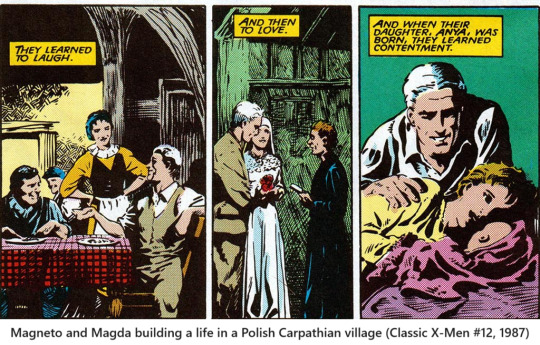

Additionally, Magneto was around 15ish in 1945, while nothing disputes this claim directly, I'm not sure he was married at 15 years old.
Pg 2 - "But Lehnsherr had learned something else about himself in Auschwitz, something which was becoming more apparent and more frightening to him everyday -- he learned he was a mutant"
Fact: Magneto didn't discover his powers until he was in Vinnitsa. He didn't have a name for it or consider himself a mutant till much later.
Pg 2 - "When Anya was tragically killed in an arsonist's fire, Lehnsherr lashed out at the villagers who refused to help save her"
Fact: Magneto was prevented from saving his daughter by secret police who were trying to arrest him for an earlier altercation he'd had with someone. He did not "lash out" just because nobody would help, he lashed out because his daughter burned to death in front of him while he was actively being restrained and prevented from helping her.
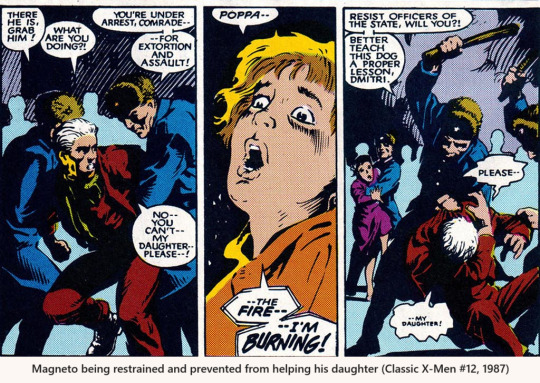
Also, it's never mentioned that it's an arson attack that caused the fire. I don't know where Nicieza is getting this.
Pg 2 - "In his misery, in his loneliness, he went to Israel -- to save his own soul. He chose to work with survivors of the camps, and in turn, helped them regain theirs."
Fact: Magneto went to Israel because he was Jewish and he had nothing left after Magda left and his daughter died. He helped other concentration camp survivors because he knew what they had been through and could help them.
Also, why is this author having such a hard time calling a concentration camp a concentration camp?
For further information on his time in Israel, read Uncanny X-Men #161 by Chris Claremont.
Pg 3 - "Lehnsherr had taken to calling himself Magnus... as if by choosing his middle name, he could bring some semblance of balance and simplicity to his haunted life."
Fact: Magnus was the only name Magneto was ever given. There was never any suggestion that he was hiding his "real" name when going by Magnus and he is referred to solely by Magnus or Magneto throughout the books. I don't know why he suddenly needed a new name in the 90's but Magneto's name was Magnus for more than a decade.
Pg 3 - "I can separate Magnus the man from Magneto the Mutant Crusader. And please note my choice of words, for I have valid reasons to label Magneto Crusader and not Dictator."
Fact: Crusader is such a loaded Christian term, it's very strange for an Israeli Jewish woman to use it about another Jewish person.
Final thoughts: I'm not against comics taking a character in a new direction or developing them in some new way. What I don't understand is why Nicieza decided to rewrite Magneto's backstory so that he would be Sinti instead of Jewish, so that the chronicle of events in his life would happen in a completely different way, and why he literally ignored all the pages that came before the three he wrote in the same issue!
If you like Magneto as Sinti, that's awesome! It has the potential to be a really cool backstory for a reboot of the character, but also remember for nearly 20 years, Magneto was Jewish and it's not wrong for that version of the character to exist without the Sinti addition. I'll also note that the current version of the Character, the Max Eisenhardt version, is also not Romani. It's one of those things that has been done and undone a few times, much like everything about the character since the Claremont era.
Also, this post should in no way be interpreted as me downplaying the suffering of the Romani people during the Holocaust. Their stories deserve to be told and characters ought to be created to respectfully tell that part of the story. What happened to the Romani people was tragic and should not be forgotten. It also deserves to be told in a more thorough and respectful way than just taking an existing character, changing one or two bits of info about him and saying that's good enough. Nowhere does this Sinti background have any meaning for Magneto, it seems more like a random fact someone added because they were bored of him being Jewish. Magneto's Jewishness has meaning for him as written by Chris Claremont, whereas Nicieza and other writers in the 90's makes no mention of the Sinti background having any influence on the character. It has no effect on his life and seems to be a change made for the sake of it. Both Sinti and Jewish characters deserve better than that.
To read more about how Magneto has been portrayed in comics read my Magneto Biographical Timeline covering the years 1963-1991.
#X-Men#Magneto#Erik Lehnsherr#Jewish#Sinti#Romani#CW: Slurs#Holocaust#Marvel#Comics#Magda and Anya#Race and Ethnicity#Magnus#Max Eisenhardt#Hack writers of the 90s#Hack Pack#xmen
23 notes
·
View notes
Text
javert is WRONG: the thesis of les mis is that legality and morality aren't synonymous!
i just found the internet's most unbelieveably dogshit hottake that makes anything woobifying javert written by Die Girlies Auf Tumblr Und Twitter galaxy brained in comparison. rest is below a cut because i got Wordy in my goal of ripping this motherfucker a new one.
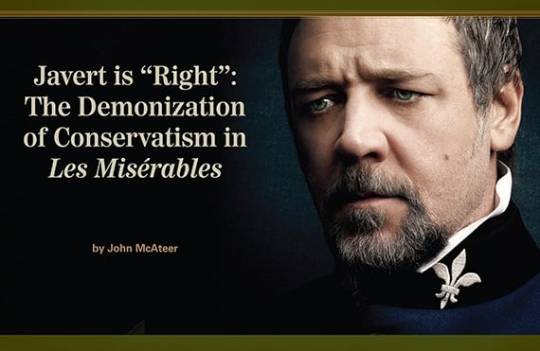
The point about “fault” is very important here. Following Rousseau, Hugo believes that the poor become criminals out of necessity. They “fall” (i.e., become poor) and then become morally “degraded.” Therefore, our response to crime should be “charity,” not punishment. This is a classic Romantic view that became the basis for modern liberalism. According to Rousseau, people are basically good and are corrupted by society, committing crime only out of ignorance and desperation; the solution to crime, then, is education and welfare. Christians obviously worry that this view has no place for the doctrine of original sin, and conservatives object to this view because it leaves out personal responsibility for crime.
i know this is a christian publication but the concept of original sin even factoring into criminality and criminal justice genuinely pisses me off. stop forcing your shitty worldview that everyone is popped outta the womb an evil sinner, i beg. the seperation of church and state is a vital part of democracy. also, you can believe people are shaped by society and driven to crime through desperation without taking away personal agency. those two things are not contradictory.
If I am right about the Rousseau subtext, then Javert is not necessarily a villain; he’s just a conservative, albeit a liberal caricature of a conservative. There are two good examples of a liberal bias in Les Mis. First, notice that Valjean’s position in his society is roughly analogous to an illegal immigrant in our society. When he leaves the prison, Valjean can’t get work because he doesn’t have the right papers. He’s an undocumented worker. In a scene from the musical cut from the film, a farmer allows Valjean to work for him, but then only pays him half as much as the other laborers. The farmer reasons, “You broke the law….Why should you get the same as honest men?”
i've never seen anyone, even javert fans, try and argue he isn't a villain. this is breaking new ground here, folks. it's a hell of an assertion, but it's demonstrably false. jean valjean is the main character. we root for him and wish to see him succeed. javert is hunting him for the entire narrative. thus, he is the antagonist. there may be some moral ambiguity on both their parts, but he structurally is the villain and that is a narrative fact.
next, as an american i am fucking BEGGING on my HANDS and KNEES for other americans to learn about the differing political terms for different countries and times if they are speaking about them with any supposed credibility. i'm not asking you to memorize every country's parties and political intricacies, but at least acknowledge that even if there is some overlap between 21st century american conservatism and 19th century french politics, that there is no one-to-one analogy!! modern american christian conservatism is a consequence of hundreds of years of unique geopolitics and religion stewing together, and you can say similar things about french politics of the time! you CANNOT just say shit like "javert is a liberal caricature of a conservative" without sounding like an utter clown because hugo was not an american liberal and javert is not an american conservative. now, if you were to alter your language a bit and say something like "javert is a leftist caricature of an arch-conservative," you'd sound less foolish (hugo's politics are hard to pin down but leftist is i believe the best label for him at the time of LM's publication. and to my understanding javert isn't really a fervent arch-conservative but it is at least a plausible reading bc he's a traditionalist, deeply religious cop and 19th century french arch-conservativism actually existed in 19th century france (shocker, i know!)). but that change in language would require actual intellect and effort to learn about other times, places, and worldviews on the part of the author, and judging by his ignorant politics, something tells me he's lacking that!
then there's the bit about illegal immigration. hoo BOY is this fucking stupid. jean valjean is a white, culturally catholic, working class french male citizen. he's an everyman of the time, his name and story of class struggle couldn't be more generic unless he was named john doe or jean dupont (the french equivalent) from nowheresville, france. hugo had a point here, and that is that as a member of the wretched poor, les misérables, valjean, representing a large swath of the french populace, is so removed from education and self reflection and truly living life that he's more akin to an animal or an object, that he's so beat down by the daily grind that he verges on inhuman. this is only magnified by his time in toulon. i'll stop there, but it is very important in jean valjean's story that he's impoverished, yes, but a french citizen. he is as french as the king, but treated like dirt because of his social status and criminal record. this sets up a dichotomy in the france of 1832 between the wretched poor and those with privilege, which is an important part of the novel.
the issue of "illegal immigration" both in france and america is a modern one. there was still bigotry and xenophobia, obviously, but the discourse around the intersections of border control, the nation state, and citizenship is a very modern one. to say "valjean's position in his society is roughly analogous to an illegal immigrant in our society" is ignorant. yes, both jean valjean and many undocumented immigrants are faced with similar abuses, but that does not mean it's intended by hugo to be a reading of the text or political commentary because let me restate this: 21ST CENTURY AMERICAN POLITICS DIDN'T EXIST IN 19TH CENTURY FRANCE!
also, valjean is the opposite of undocumented. he has his yellow papers, which are quite literally documents that are the root cause of the daily discrimination he faces, hence why him ripping them up is a radical act of freeing himself from the control of an unjust state. i don't even know how you miss this, it's stressed in the movie musical multiple times.
“Men like you can never change,” he tells Valjean. But Javert is not simply being prejudiced here. He knows from his own experience that it is possible for the poor to pull themselves up by their bootstraps. Javert, too, was born in poverty. He is “from the gutter,” as he puts it, but he embraced law and made something of himself.
oh, of course the bootstraps ideology rears its ugly head. not even gonna waste my breath on this one other than to call it stupid and wrong. all javert made himself was a class traitor and a bootlicker, and that's honestly tragic.
Consider a second example of liberal bias. The character of Fantine is designed to elicit the viewer’s sympathy for “welfare mothers.” Fantine, a young, unwed mother in Valjean’s factory, faces persecution from her coworkers. The factory foreman expresses a conservative attitude toward charity: “At the end of the day, you get nothing for nothing.”
this part. this part was so unbelievably cruel and so far removed from the empathy that this narrative bleeds that i had to step back from writing this and take a smoke break. firstly, fantine is NOT a stand in for "welfare mothers", which is, once again, a modern conservative strawman! the welfare state did not exist in 19th century france. there was little to no support for mothers in fantine's position, and to my knowledge, none stemming from the state. hugo was writing her character to bring to light the unfairness of her position. she had a lover who left her flat out, with a child to care for and no financial support. she was ostracized, eventually fired, and resorted to survival sex work.
Fantine shouldn’t expect special treatment, but rather should take responsibility for the consequences of her own sexual license.
fuck you, john. where in the text did she ask for "special treatment". where in the text did she do ANYTHING but take responsibility for her child. she sold her hair. she sold her teeth. she sold her body. she got sick because of her living conditions. she died. all out of love for her child. also, framing children as "a consequence" is disgusting, and you should be ashamed of yourself and reflect on why you think that's an alright way to view a living, breathing, human being. if you don't wanna take my word for it, psalm 127:3 clearly states "children are a gift from the lord; they are a reward from him," so your stance is decidedly unbiblical. children aren't punishment.
Likewise, when Fantine turns to prostitution to feed her child, Javert is unmoved by excuses. Valjean’s family was starving, and Fantine’s daughter was sick, but these facts don’t excuse them for breaking the law. Theft and prostitution are wrong, and it is Javert’s duty as police officer to arrest them.
how is theft to feed a starving child immoral. how is sex work to ensure your child lives immoral. give me ONE reason aside from your and javert's religious worldviews that either of those things is wrong. "but the bread didn't belong to valjean!" and would inaction, watching his nephew die simply because a windowpane and empty pockets separated him from a piece of bread be more moral? is watching a child die when you believe you can save them the better option? the whole point of this damn book is that legality is NOT synonymous with morality. javert may have the legal high ground, but he does NOT have the moral high ground, and when he realizes this, the thesis of the book, he fucking kills himself! for an example outside the text to perhaps get it through your thick skull: slavery was legal. biblical, even! does that mean it's morally right? no!
Thus Les Mis is designed to get us to see Javert’s conservatism as cruel and to elicit sympathy for Hugo’s liberal social policies. It should be noted, however, that Les Mis is a caricature of the conservative position. Conservatives agree that we ought to treat the poor with dignity and compassion. They think that compassion programs, however, should be administered by the church instead of the state, and they think true dignity requires personal responsibility and submission to the law.
how can javert both be an exaggerated, cruel conservative caricature and be right? i'd argue he's both an accurate portrayal of the inherent cruelty and misanthropy present in the politics of the political right, and that he's decidedly wrong as proven in the text. jean valjean is a good man, despite it all, but javert couldn't see that because of his worldview and chose to relentlessly hound him until he finally realized his mistake, a realization that overcame him so strongly that his only solution in his mind was to kill himself!
and do conservatives actually agree they should treat the poor with dignity and respect? it's in the bible, sure, which christian conservatives hold as the absolute truth, but in this very article you, a christian conservative, have expressed nothing but contempt and cruelty for undocumented immigrants, for unwed mothers, for thieves and sex workers. for les misérables - the wretched poor. and why shouldn't the state handle "compassion programs" as you call them? the gov't is electable and manageable (in theory), unlike the beast of untraceable wealth and power that is the church. we don't live in a theocracy, so the only reliable way to ensure people get the help they deserve is through the state, which can actually be held accountable for these expectations (again, in theory). that's more than you can say for the church.
The fact that Les Mis contradicts evangelical theology does not mean apologists shouldn’t use it—on the contrary. We can help non-Christian fans of the musical see how the vision that draws them toward the story can only be fulfilled in Christ.
his conculsion is LAUGHABLE. personally, the "vision that drew me to the story" at age twelve was my attraction to men. i'm a flaming homosexual, you see, and a transgender one at that. the overwhelming majority of musical theater fans i've encountered are some variety of queer. at age 22, ten years later, i'm drawn to the story still partially because i find these characters attractive and magnetic, but much more so for the literary and socialist political value i find in the narrative. i'm an unrepentant leftist as well, as are literally every other les mis fan i've ever met (besides yourself, of course). i've found more fulfillment through reading les misérables than i have in my exploration of the new testament, and i'm not even done with the book yet!
i don't really know how to conclude this other to point and laugh at john and his publictaion, because somehow i stumbled upon a conservative fan of les mis and the lack of self awareness is more baffling than i could have ever imagined it being
#len's meta#les mis#les mis meta#les miserables#les misérables#les miserables meta#les misérables meta#javert#javert meta#god this took forever to write up bc i had to keep taking mental health breaks. it ticked me off THAT much
77 notes
·
View notes
Text
The Trolley Problem in SMTIVA and why I keep choosing Dagda
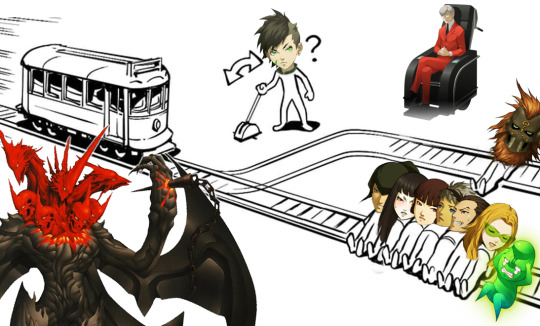
There are several ways one could analyze Danu and Dagda's philosophies (and in far more detail) but for this post I'll be talking in a simple and straightforward way through Pros & Cons with in-game evidence.
Personally, I see Bonds and Massacre's essential difference standing on 'I care for the now' and 'I care for a future with no suffering'.
-----Bonds-----
The price: - Dagda is replaced by a Dagda shaped by Danu - Humanity will continue to depend on religions thus the cycle of suffering continues for both humans and those who rely on human understanding (gods, angels, demons etc)
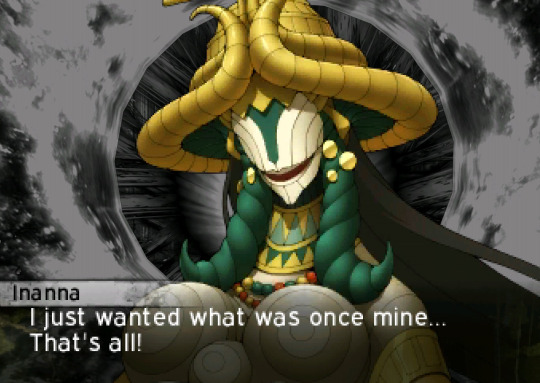
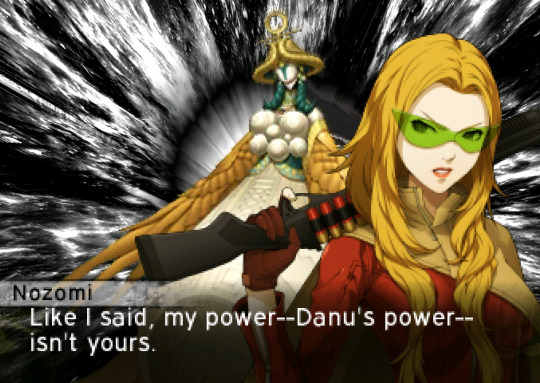
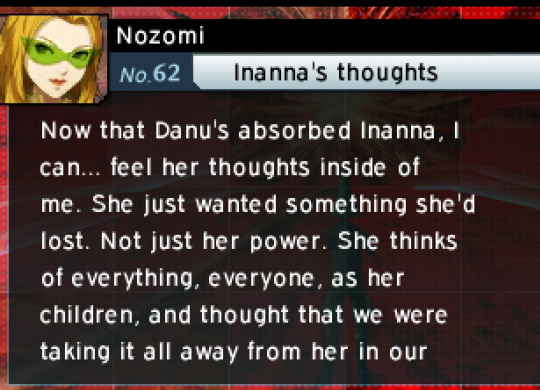




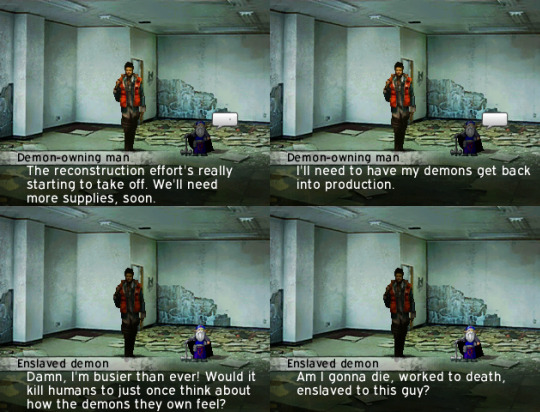
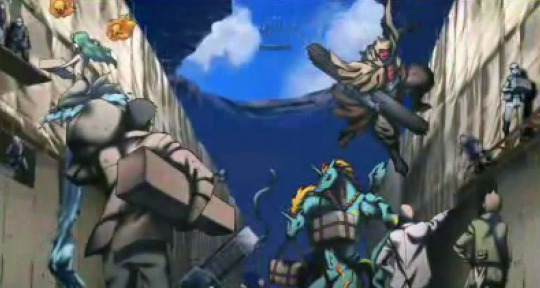
But you get! - The souls that were going to build the Cosmic Egg are set free - All of your teammates are alive with their sense of selves intact

It's an ending that favors the human side as it doesn't put the focus on blaming the humans but 'bad and tyrant' gods. Even though they become bad specifically from the observation done by humans.
Gods and demons will continue to exist by being observed and exploited and blamed on for their misery. But for Nanashi what matters is that his friends and allies are well and working together. For now.
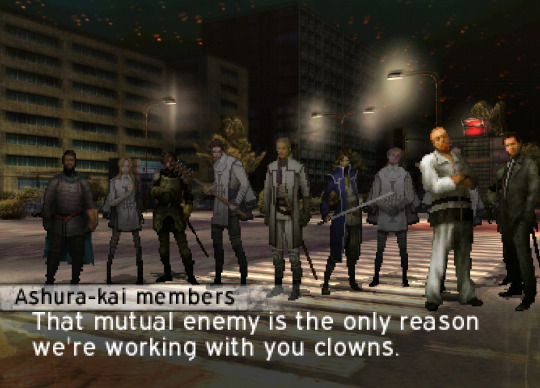
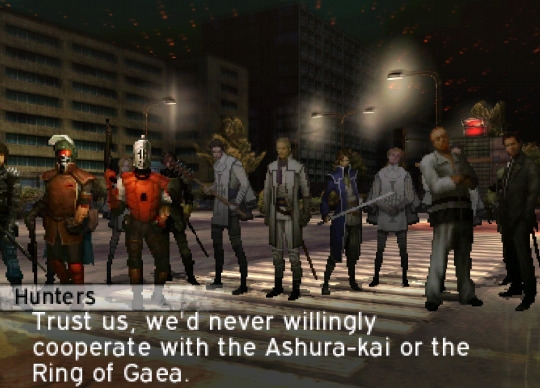
-----Massacre-----
The price: - Human souls will be sacrificed to build the new Universe - Your teammates are alongside the sacrificed and if revived, have a different sense of self

But you get! - Dagda stays as the original Dagda - Humanity will become independent and self-sufficient from religions, sets free those who rely on human understanding (gods, angels, demons etc)
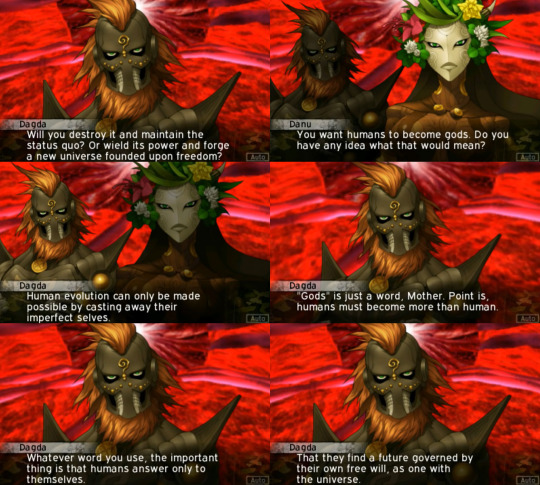
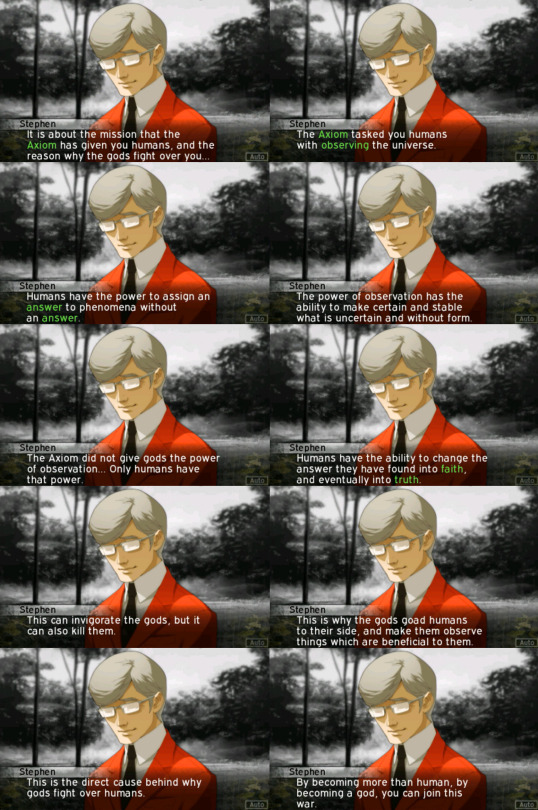
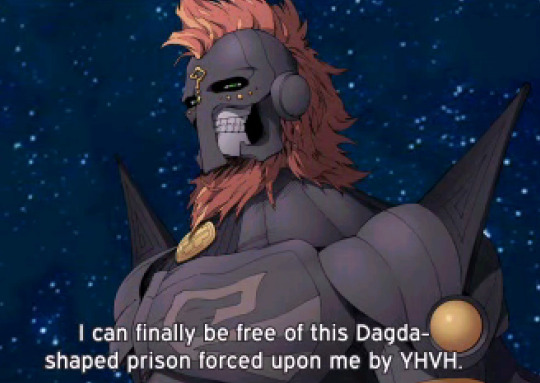
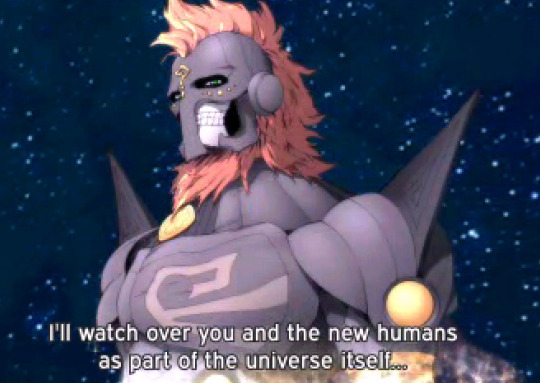
Here, Nanashi accepts solitude and taking on Dagda's god position for a future where religions and myths become pointless. No biases or influences that could twist the original nature of the world anymore so new humans will be born with unlimited potential of using the truth of the world for themselves instead of leaving it at the hands of deities. Unless an exterior force comes.
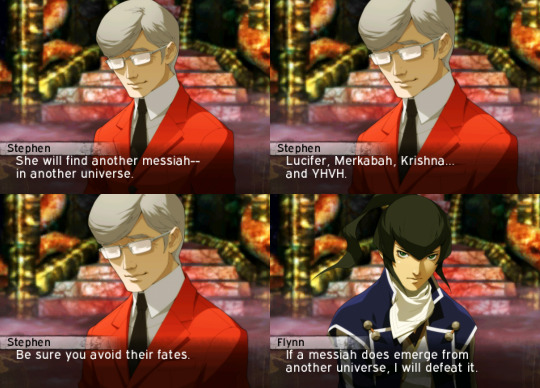
It's important to keep in mind that as cruel for his methods Dagda is considered, he doesn't favor a specific religion or way of thinking like how Law does and just wants Nanashi to avoid the root of his problems: the observation done by humans. To consider Nanashi as if he could be a second YHVH is to go against what Dagda is preaching for (and Dagda will still watch you as he disappears).
The best argument for this is shown in this summary from page 110 from the SMTIVA artbook (translated by dijeh):
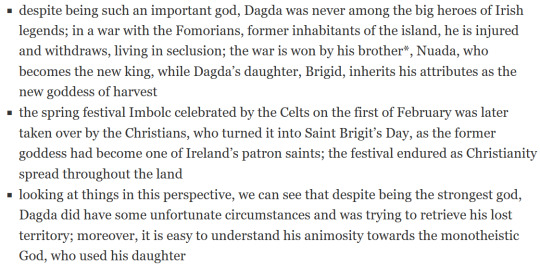
As sidenote, while Brigid isn't shown in the main story, she has a cameo in Tír na nÓg (aka the DLC area where Dagda makes it available for you to train), in which Nanashi can meet various Celtic figures from pre-Christian Ireland:
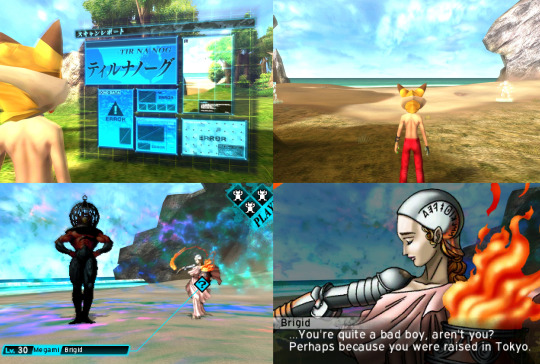
So if you are going to point out Dagda taking advantage of the mental state of Flynn and your Goddess, just scroll up and look again at what Danu does. They use the exact same method, with the real difference between them is that Danu's solution is an endless cycle of punishing and policing ideas that will keep being reborn from humans while Dagda wants to give future generations of humans the power to not depend on religions and on the same line, towards gods and demons the freedom of expectations to conform to what humans demand of them.
The irony is that Danu's kind and wholesome outcome favors way less groups in the long way than Dagda's despite the game constantly throwing at you that he is the most self-centered of the two.
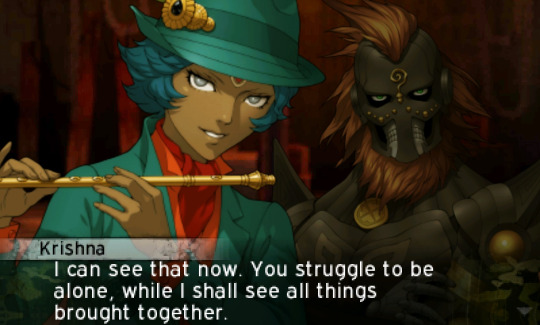
Krishna, the most fitting force to compete against Law and Chaos since hinduism is one of most popular religions (approx. 1.2 billion of adepts), advocates for the pagan religions to side with him so each gets its own slice of followers for a world order of polytheism instead of monotheism. It's an ending that favors deities associated to polytheism. Dagda does the opposite to Krishna: 1) uses the fact he is not a very well-known deity and hides in the Axiom from interference from other people and YHVH himself until he could meet someone with a powerful will as Nanashi so he can 2) force all deities and demons altogether to return to the nature.
Dagda's ending strips the powers and authority of all religions and gives them to humans.
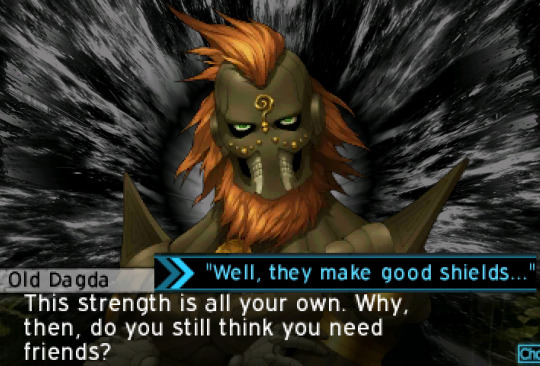
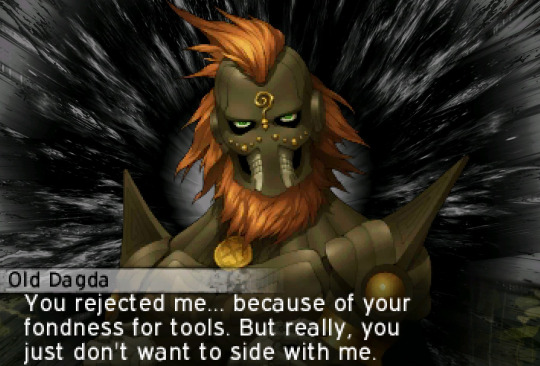
Now, obviously we also count that how a player considers the 'price' and the 'reward' will commonly vary from the theory (f. e. players picking a side for liking or disliking a character regardless of the meaning behind their alignment or viceversa).
In fact, SMTIVA validates this option as you can still see Nanashi being able to choose dialogue where he looks down on his teammates while also disagreeing with Dagda.
Meanwhile, Nanashi in Massacre is able to show compassion when parting ways with them as well.
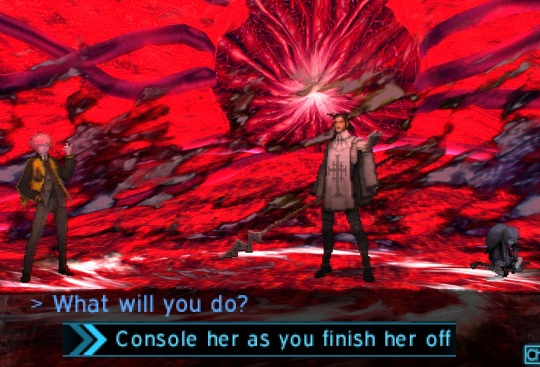

In other words, there's no such a thing as a route where Nanashi is 'locked' into a single type of personality. Nanashi can canonically choose a route for ulterior reasons beyond what Dagda or Danu originally wanted them to be.
The duality of being friendly out of selfishness or being aloof out of not wanting to be heartbroken are all possibilities.

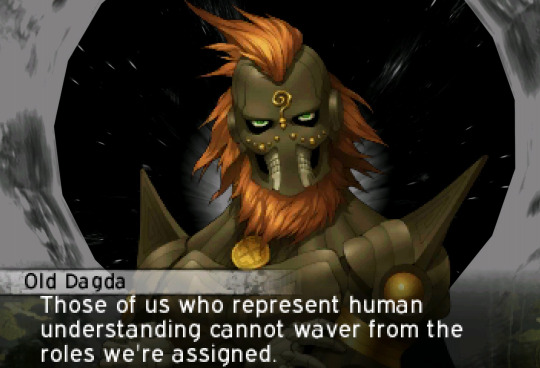
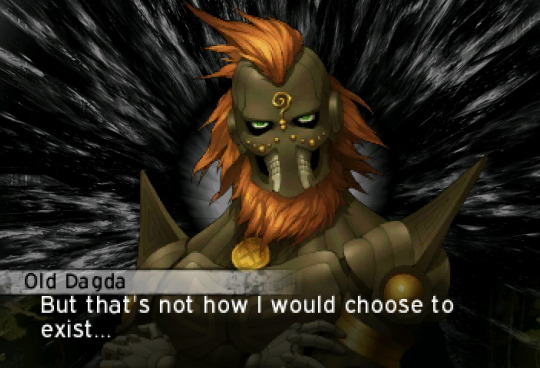
One could even say that the latter is present in Dagda himself, particularly from the ways you might be able to view his relationship and treatment of Nanashi.
To put it simply, the perspective of Dagda seeing a son in Nanashi after getting distanced from his daughter and Nanashi seeing a father in Dagda due to his orphan background and rather... unbalanced dynamic with Asahi and Boss.
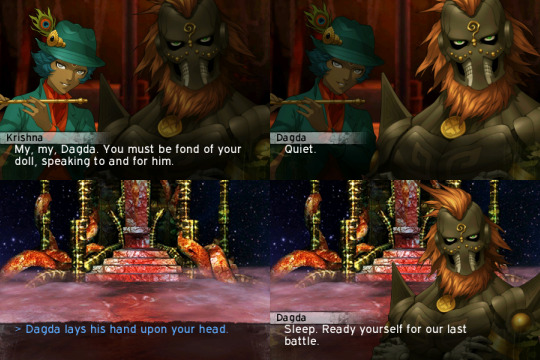
As how a certain quote goes, the opposite of love isn't hate, it's indifference. Taking into face value Dagda's grievances with influence caused by bonds with other people is similar to villifying the Chaos side without understanding the nuances of Law being what demonized it in the first place.
Dagda is intentionally made to be the bad apple of the game as a smokescreen for the player.
18 notes
·
View notes
Text
american psycho: he's just like me fr
In No Longer Human by Osamu Dazai, there’s a passage where the main character, Yozo, who is ostensibly Dazai (it is a semi-autobiographical book), struggles to figure out exactly what the hell his Sister wants from him in a fairly obvious situation:
“One autumn evening as I was lying in bed reading a book, the older of my cousins–I always called her Sister–suddenly darted into my room quick as a bird, and collapsed over my bed. She whispered through her tears, “Yozo, you’ll help me, I know. I know you will. Let’s run away from this terrible house together. Oh, help me, please.” She continued in this hysterical vein for a while only to burst into tears again. This was not the first time that a woman had put on such a scene before me, and Sister’s excessively emotional words did not surprise me much. I felt instead a certain boredom at their banality and emptiness. I slipped out of bed, went to my desk and picked up a persimmon. I peeled it and offered my Sister a section. She ate it, still sobbing, and said, “Have you any interesting books? Lend me something.” I chose Soseki’s I am a Cat from my bookshelf and handed it to her. “Thanks for the persimmon,” Sister said as she left the room, an embarrassed smile on her face…”
At this moment, Dazai/Yozo provides an accidentally hilarious moment through his lack of empathy. Even though Yozo faces similar despair, he is unable to connect sadness to the sadness of others. After several trials of this sort of situation where a girl comes to him crying for support (which despite his wishes is a recurring theme in his life), he has figured out a simple, effective solution—distract them with sweets, books, anything at hand, even a suicide pact.
Of course, this isn’t the correct “answer” to these situations. He could have just… talked to her! But this is impossible for Yozo because claims to be completely disconnected from her. And he’s too terrified to try to reach out. He imagines that all other people have a monster behind their mask, ready to attack him at will.
The entire book is like this, a person who doesn’t know how to interact with other people because he is actually terrified of everyone around him, which is all rooted in his feeling of spiritual isolation. The title is a direct statement of the narrator’s feeling towards the world around him—as someone who is just faking being human, what point did he have in existing when he has to live in fear of everyone around him, who is ostensibly better at this being “human” thing than him?
American Psycho was this to me, an attempt by another alien (Patrick Bateman) to decipher exactly what the hell is happening in 80’s yuppie corporate NYC. Or as he aptly puts it:
EVELYN Well, you hate that job anyway. Why don't you just quit? You don't have to work. BATEMAN Because I...want...to...fit...in. I think he wants to fit in!
Patrick Bateman has decided, unlike Yozo, that he will fit in. He—at least, consciously—believes that he is stronger than everyone around him. Christian Bale does an awesome job monologuing with the emphasis on monotone, dry, and powerful from his ability to seemingly separate himself from the riff-raff around him. This might be why a lot of men (from what I have heard, no citation given in this article) take from this movie that this is the way of a “sigma” male, one who is different from the rest of the pack.
(This is where I would submit my sigma male test score but I couldn’t find the screenshot.)
fear and anxiety
Because of all the (wrong) takes on American Psycho being anti-feminist because of its violence against women, or the idolization of Patrick Bateman because he can cull his competition, you would think Patrick is good at killing people. This is not true in the movie. Patrick Bateman is actually very, very bad at killing people. When he kills Paul Allen, he becomes a total wreck, running through his apartment to come up with some sort of alibi, slamming open closets and desperately packing together a cute little travel set. Not that I would know how to commit a murder, but you would think for someone who considers himself to be in control Patrick would have a better idea on how to proceed with this kind of thing. His answers to Detective Donald Kimball’s questions range from guilty to insane. When Detective Kimball asks him if he knew Paul Allen was missing, Patrick jumps to asking him if the “homicide squad” is deployed on the case.
He even panics out of a murder when Luis Carruthers hits on him because it’s so unexpected, ending with Patrick desperately looking for any reason to just leave (“I’ve gotta… I’ve gotta… return some videotapes.”—as a bonus, he uses this SEVERAL times in the movie to leave uncomfortable situations). He then washes his gloved hands in the bathroom in an attempt to try to return to a “normal” interaction. It’s not pride and power pushing him forward. It’s anxiety!
Like Yozo, Patrick is also afraid. When he lies to Jean that he got a reservation for two at Dorsia (his trigger word apparently), he decides that the only course of action is to kill Jean before they make it to the restaurant. To directly discuss the traditional idea of toxic masculinity (as referenced by the men who want to be Patrick), theory would say that Patrick kills to gain power over women or to flex his masculinity. But his pride isn’t on the line when he tells Jean that he got a reservation to Dorsia. And he’s not trying to be powerful and masculine when he decides that killing Jean is the only solution. His decision is a panicked answer to stay disconnected from Jean at any cost.
Just as Yozo accepts a suicide pact from a woman because he doesn’t know how else to comfort her while avoiding connection to her, Patrick decides with how smoothly he handled Paul Owen’s murder that staging another murder is a get-out-of-jail-free card from the impending doom of having to admit that he actually can’t get a reservation for Dorsia.
And his Dorsia fear manifests in reality as a personal hell when the maître d’ hysterically laughs at him, screeching, when he first calls for a reservation that night at 8:30 for a date with Courtney. The second time he calls he gets a normal response, with the maître d’ telling him that the restaurant is completely booked for the night. But Patrick’s fear response is already baked in from the first interaction he created with his own anxiety.
societal normalcy and self-acceptance
There’s something deeply relatable to the need to try to figure out what is “normal.” Especially, the further you might naturally be from “societal normal,” the harder it is to try to figure out how to get there. At this point, the proverb “be true to yourself” might seem to come into play. But our urge to be normal is because we want to connect to others. We want to not be alone, even if that’s at the cost of suppressing our true selves.
Patrick manages to fit in at the boy’s club at work by performing all of the gestures of the others, at lunch, at Christmas parties. But his true self is completely isolated from his coworkers. He’s someone who is unrecognized as his own person to the point that people mistake his identity for others in the group. His fiance knows nothing about him and doesn’t care to, even when Patrick is trying to tell her that he has homicidal urges. The only reason she’s even getting married to him is because they have the same friends and breaking up “wouldn’t work.” Even Carruthers only hits on him because of the clothing he wears.
But even when you fit in, you want people to understand you. So Patrick tries to connect with people over and over again. But when he does try, it’s unreciprocated. The only time he can talk about his interest in pop music is with prostitutes he hires for sex—almost as if the sex is just an excuse (which might be why his violence is also focused on them). His jokes constantly fall flat with his peers. His joke about Ed Gein sticking women’s heads on sticks could be inappropriate (and is given the rest of the context of Patrick’s personality), but it’s a very vulnerable moment for Patrick. He is purposefully revealing part of who he is and receives worse than a bad reaction—no reaction. When your friends rebuke you, it’s a decision to reach out and connect out of care. No reaction is the choice to pull away.
And when he finally does meet someone who is genuinely interested in him as who he is and is willing to reach out to him, he is unable to complete the connection. Jean is the only woman in the movie who isn’t willing to mask to just “fit in.” When Patrick takes her out and talks to her in his condo, we can immediately get a sense of who she is because she’s telling the truth. But Patrick takes this vulnerability and tries to push it away from him—thus the attempt to kill her with a nail gun—and fails as his own vulnerability (he’s cheating on his fiancee) is revealed via inopportune phone call (from said fiancee).
Silence. Jean is obviously embarrassed and upset. JEAN Was that...Evelyn? Silence. JEAN Are you still seeing her? Silence. JEAN I'm sorry, I have no right to ask that. Silence. JEAN Do you want me to go? A long pause. BATEMAN Yes. I don’t think I can...control myself. JEAN I know I should go. I know I have a tendency to get involved with unavailable men, and...I mean, do you want me to go? Another long pause. BATEMAN If you stay, I think something bad will happen. I think I might hurt you. (Almost hopefully) You don't want to get hurt, do you? JEAN No. No, I guess not. I don't want to get bruised. You're right, I should go.
And at the end of the movie, Jean is the only one who is able to find Patrick’s “true nature” because she is worried about him after he calls her. Patrick doesn’t reveal who he is to her. She’s the one who searches his desk and finds the drawings he has made of his compulsions, of his real or imagined crimes against humanity.
violence
After violence, Patrick responds with desperation and panic. We even see this in Paul Allen’s murder, the one murder Patrick seemed to really enjoy, where Patrick scrambles to come up with something so that he avoids getting caught. Patrick claims to have killed Christie only because “she almost got away.” In the final chase scene, the consequences come for him at an amazing tempo; police cars surround him after the sound of the first shot dissipates into the air, he escapes but is surrounded again and forced into a shoot-off, then is chased down by helicopters.
But that’s ridiculous—it’s totally fantastical. Because these scenes are in Patrick’s view of reality, it suggests that he wants to get caught. Patrick wants to be held accountable because it’s the only way he could imagine others understanding the immense amount of pain he’s in.
Part of our connection to people who really like us for who we are is that they can help us understand when we feel off. We want our pain to be vindicated as something that’s not okay. In times of desperation, we want to be able to reach out to others and hear sympathy, or reassurance that we are right to feel that something is wrong and that we should go get it checked out.
Patrick describes his need to hurt other people as a consequence of being in pain in the first place at the end of the movie. It’s a call for help for someone to notice and get him arrested so he can get fixed. But Patrick is completely alienated. Beyond Jean, nobody else cares about him to bother being concerned. When he tells a woman that he’s into “murders and executions,” she mishears it as “mergers and acquisitions” due to the level of attention she’s giving that conversation. When he leaves a long, rambling confession of all of his murders to his lawyer, his lawyer first mistakes him for someone else, and then laughs it off as a silly joke. Even as Patrick tries to double down and tell him that he was telling the truth, his lawyer takes the reality of the situation (that Patrick is at least delusional, since Paul Allen is alive and kicking) and decides to tell Patrick off for taking the joke “too far.”
In Patrick’s last monologue after his conversation with his lawyer, he “surpasses” having anything in common with the least sympathizable people.
BATEMAN (V.O.) There are no more barriers to cross. All I have in common with the uncontrollable and the insane, the vicious and the evil, all the mayhem I have caused and my utter indifference toward it, I have now surpassed... INT. BATEMAN'S OFFICE - DAY Jean is alone in Bateman's office, looking through his diary. We see the pages that she is looking at. They are filled with doodles of mutilated women and their names...Jean looks lost and frightened, and begins to cry. BATEMAN (V.O.) My pain is constant and sharp and I do not hope for a better world for anyone. I fact I want my pain to be inflicted on others. I want no escape. INT. HARRY'S BAR - EARLY EVENING As the film ends the camera moves CLOSE on Bateman. He is leaning back in his leather armchair, drinking a double Scotch, his eyes blank. BATEMAN (V.O.) But even after admitting this, there is no catharsis. I gain no deeper knowledge about myself, no new knowledge can be extracted from my telling. There has been no reason for me to tell you any of this. This confession has meant nothing...
He knows that losing his connection with even the most insane people will mean his internal pain will find no catharsis. Nobody can reach him and soothe his pain. So he inflicts his pain on others, even though it doesn’t help his pain, because it’s better than not doing anything. All he has left are the drawings that Jean has discovered, his last call for help.
Pain will always exist. But connection makes us understand that our pain is human, even our pain seems to come out of us in terrifying ways. In this way, Mary Harron has created a feminist movie by simply letting guys have emotions. The consequence of allowing men to have feelings is that they want to find other people who truly understand them. Patrick and his coworkers simply “fit in” but they don’t belong to each other, to anything at all beyond a sheer facade, a mask that can be put on and peeled off at the end of each day.
Then maybe we can rework toxic masculinity from being a way to have power in social situations to wanting to just “fit in” as a way to get some sort of connection to others, even if the people you hang out with don’t really understand you. But the consequence of this is that these shallow connections don’t fulfill us, and when we undergo pain, it becomes easier to take it out on these people that you don’t even like anyway, or people who aren’t even in your ingroup. When men see Patrick Bateman as a sigma male, is it that they see someone in control? Or is it that they see someone who shows a way to cope with the pain they feel, even if the method is violent and doesn’t even work, but at least it seems cathartic on the movie screen?
8 notes
·
View notes
Note
I’m very curious, seeing as you have family in Israel, how do you define antizionism and zionism? Because my definition of zionism is literally just the belief that Jewish people should be able to have our own sovereign state in our ancestral homeland (and so should palestinians ofc- i’m in favor of a two state solution with an overarching coalition) Are you in favor of some kind of two state solution, a one state solution with the state being called Palestine, or do you not believe that a Jewish state should exist at all? And with that, do you believe that muslim and christian countries should also not exist?
This isn’t an attack, I’m just very curious bc I don’t personally know a lot of israelis who consider themselves antizionist!
Jewish Zionism is a broader term than I think a lot of goyim like to believe. I don't think it is as simple as believing in the eradication of Palestinians/being against the liberation of Palestinans (which many goyim seem to, it's very confusing and reductionist). Some people might consider me a zionist because I believe that Jewish people should be living in Palestine/Israel and that space should be made for them, as well as believing in Jewish indigeneity to the region. I think it means different things to different people. However I, broadly agree with your definition from a politically relevant perspective. The complexity of this situation is nuanced, Jewish people are indigenous to Palestine/Israel however this does not necessitate an ethnocracy (term coined by Oren Yiftachel, please look up his work he is a brilliant Israeli political geographer, here's a video by him), especially because Palestinians are ALSO indigenous to the area.
Besides that, diasporic communities who have been so displaced for such a long time have the right to connect to the land and some right to even live there-- but they ALSO have a responsibility to respect the sovereignty of the indigenous communities who are still on that land. These people who still live there have tended to the land and kept it safe for generations, it is our responsibility to listen to their voices on how the land should be treated and respect their right to their homes as it is theirs ancestrally as well. Along with Muslim, Christian and other Palestinians who lost and are losing their homes, farms, families etc, there were Jewish Palestinians who's land was stolen too. Never forget these people should have sovereignty in this area.
Here is the sticking point, I think-- my rejection of a Jewish ethnocracy is what makes me an antizionist. I did not always consider myself as such, but I began to identify as an antizionist in my late teens because I realized that the creation of an ethnocracy is the issue. I think the conflict is less religious than people like to acknowledge, especially in Jewish circles since it is an ethnoreligion, but Israel is an ethnocracy and not a theocracy. It privileges Jewish people but it considers itself to be a secular state, though just like the US, religious ideals have also taken hold.
Ideally I would be in favor of a one state solution that gives the stolen homes and land back to Palestinians, that the apartheid in Israel should end and makes reparations while also finding a way to not displace Israelis. I think the government should be made up of both Israeli and Palestinian people. I think the voices of Palestinians should be centered for a while as we rebuild after the genocide. This is (loosely) in line with how I think decolonization*** in countries should be handled in general, including on Turtle Island, in Aotearoa, in Hawaii etc etc
This is, given the situation, very unlikely and many left-leaning Palestinians and Israelis have said that only a two state solution is likely, and I trust the voices of those on the ground in this more than I trust US voices (which includes myself, I am not Israeli but my family is). I am committed to listening to Palestinian voices above all others as they have faced untold violence and displacement. I hope we find the most peaceful, just and fair end to this genocide as possible.
I am, in fact, opposed to ethnocracies and theocracies, they are both pretty terrible systems that harm the people who live in them, including the people who are part of the dominant class. I do not believe that ethnocracies or theocracies benefit anyone involved.
*** (sidenote: I do consider Israel to be a colonial project, but not just by Jewish people I think it is a colonial project mainly funded and spurred on by Christian zionists/nationalists as well as prominent military powers, most obviously the USA. There are more Christian zionists worldwide than there are Jewish people. Not Jewish zionists, Jewish people. That should tell you something about who is voting in favor of this and who is funding it. Also, tumblr is VERY resistant to linking the YouTube video of Oren Yiftachel, so here it is hopefully it works: )
youtube
#palestine#palestine liberation#free palestine#zionism#anti zionisim#jewish antizionism#antizionism#jews for palestine#dragon talk
6 notes
·
View notes
Text
Crime and Punishment and media literacy
Jordan Peterdon claims his favourite book is Dostojevskij's Crime and Punishment, and claims he likes it because "it is why atheism does not work".
Because Raskolnikov, a good man in a bad situation, after spending the first act on thinking if he should kill a horrible landlady to save a family, goes on with the murder, then spends the rest of the book battling his conscience, morals and trying to justify his actions, also expecting punishment for his crimes.
Let me adapt Crime and Punishment to the 21st century for a moment. Obviously not perfect, because 18th century Russia and 21st Century USA are different socially.
John Raskov, a citizen of the US, lives in a New York suburb. He loves Anna, but Anna and her family live in a 20 square meter apartment that leaks gas every Thursday. They can not afford food at every few months because the landlady there demands random rent every week, spends her time drinking and always walks around with a loaded gun when she demands the rent. John sees her shoot into the floor next to a crib one time, and so he spends half the day wondering what to do. He figures that she is a "bad guy with a gun", and to stop her, he needs to be "a good guy with a gun".
So Raskov goes, buys a gun and shoots her.
This is the first 30 minutes of the movie. The remaining 60 minutes is John in agony over the murder, nightmares, horror scenes, seeing the blood, turning him from "a good guy with a gun" into a murderer. He expects the cops at any minute to shoot him, he considers hanging himself, he considers himself scum. We deconstruct the entire idea, we examine the criminal system, we examine how John may be an unreliable narrator, a villain, or a hero, how the US laws don't protect the family but him, John Raskov, a cis-het white dude with lower-middle class income, can get away with it, how he legally cozld get the weapon, how society is often lauding people like him as heroes, paint gun violence as a heroic deed and vigilante justice as an American solution, how a "good guy with a guy" and "murderer" differ. We tear apart the very movie itself to see John in the middle, as a pathetic, self-hating man who thought one murder can fix the world.
Credits at him walking to the door.
Peterson and friends would probably not understand why John spends more than 2/3 of the movie agonising and having this self-imposed trial, why it is so long and detailed, why are all the action is just until the only shot in the movie. They would claim this is where atheism leads, even if John himself is shown to be a Christian and uses a Bible verse as part of his justifications, after all, at the rivers of Babylon, we all wept of joy, etc etc.
My guess is because they lack the media literacy to understand Crime and Punishment. The plot is relatively simple, the point is to deconstruct not just Raskolnikov, but the system that produces Raskolnikov and the landlady and the way he almost gets away with a crime he never wanted to commit but seen no other solution, because the law was not permitting anything else but breaking it.
18 notes
·
View notes
Text
Morgana, the War on Camelot and Why They Couldn't Just Negotiate Something Out
ON MORGANA
like really .. you can think of bbc morgana as a political activist that came from the elite. She's the smart, opinionated, confident and politically relevant individual. She used her priviliged voice multiple times against their kingdom's highest authority as a way to represent the marginalized that she also belongs to... only for her to get imprisoned, chained, grounded and constantly lied to. She gets mixed in with the more radical group of people, gets even bolder to the point of staging assassinations and coups. Destiny comes to a head and then she becomes isolated and radicalized straight up to the point that she became a full-on insurrectionist and usurper.
Bottomline was She wanted her home to be a better place for her and for everyone. Yet dspite her doing everything to be honest, to follow the rules, everybody pushed her away in one way or another. Plus her own internal suffering never really stopped. And in the end she just... ran out of options...she kept running out of options.
ON MORGANA BECOMING A USURPER/ INSURGENT/ CONQUEROR AFTER HER COMPLETE RADICALIZATION
If taking up arms (and government destabilization by whatever means) was the only way left, then so be it. Even if it means ridding the city of its current inhabitants. She could always repopulate it with more deserving people anyway.
Cruel but i think there was one ottoman king who said and did this when he besieged a city (prolly constantinople but meh, this was common practice).
Her one-year radicalization has taught her that the none of the citizens except for a very few deserved to be saved. In this type of thinking, as conqueror/warlord, all they need is land/territory anyway coz people will come and want to settle in regardless. It's like "new world order" "utopia" kind of thing. Cleansing the world (or kingdom) completely and building up a new one. Very.. insurrectionist-y (and honestly it is quite christian apocryphon-y... ragnarok-y? you get the gist.)
People get too hung up on "she's a crazy evil witch" that they forget what her political power struggle was initially about. Her lasting solution and the one that Morgause taught her was to create a world where she(and hopefully others) would be free, damn it all, and also damn those who defy her.
ON HER WAR FOR MAGIC.. AND THE STATE OF MAGIC IN THEIR WORLD IN GENERAL
"she didnt really help the magic folk tbh"
oh but i think in a way, she did... she gave the ones, the factions, who have always risen up in arms more hope and more fuel in their hearts. Like some may have not have joined her cause immediately but it emboldened them further because someone else who's powerful, who is an elite, who is nobility, was giving them a voice and banner to run cover AND to destroy and takeover the kingdom and the dynasty that started their oppression. She was helping that faction of the magic folk indeed.
Remember that only a few were part of the prophetic magic sect. Less even knew about the prophecy and if they did then it was a closely guarded secret.
So it should not be surprising that a majority of magicfolk wouldn't want the bigoted Arthur Pendragon as King and some unknown supposedly powerful sorcerer who never shows up would rule them all.
Hell no. and they would fight it. and they are justified to do so. (just as merlin was justified to do what he does)
ON JUSTIFICATION AND ETHICS
Like I said, rebellions and government takeovers are always tricky. Everyone is justified, everyone can resort to cruelty just to get what they want. There is manipulation and betrayal and unethical decisions on all sides.
ON THE POSSIBILITY FOR ACTUAL DIPLOMACY
But they can always negotiate and be diplomatic about it if they wanted to. if they played their cards rights bloodshed could have been averted. But that means both sides must have something to offer.
but in bbc merlin... Camelot fell short of that.
WHAT MORGANA HAD
See, Morgana knew her demands. She knew what she wanted. She knew what she was fighting for. She knew what to leverage. She had the
legitimate claim (being of Uther's direct bloodline, which was apparently already enough to challenge kingdom succession),
the justification (a new camelot that accepts Magic),
the strength (being immortal and a high priestesss),
some nobles (Agravain),
influence (her name is known far and wide),
wealth (presumably Gorlois' land holdings as well as previous territorial gains) and
a strong foreign army (Helios) backing her up.
the (imminent) support of people both magic/nonmagic who want to see the end of the regime.
Moreover Morgana (and others tbh) had been destabilizing the kingdom for years anyway. The weakness, the cracks were already there, waiting to be exploited, always being exploited. Anyone with a mind for it would have found it so so so easy to just... take it.
WHAT ARTHUR HAD (TBH NOT A LOT)
Meanwhile Arthur did not know what he had. He had nothing to bargain because he lacked the information. The only bargaining chip he could have had was just hiding from him in his own goddamn court. Arthur didn't even know about the state secrets of his own kingdom, which by the way, were very important state secrets (that magic had kept the kingdom safe all those years).
Arthur had no leverage other than him being (1)heir-apparent, (2)his skilled but limited retinue and (3)decently fortified castle (4)weakened and easily defeatable ally kingdoms. He doesn't even have a succession plan. Magic isn't accepted in his kingdom in any manner possible (plus he's too deathly afraid of it).
MERLIN'S FAILURE
Merlin/Gaius/Kilgharrah, by hiding Emrys AND THE PROPHECY, deprived Arthur the leverage that they needed diplomatically against the political institution that Morgana already was. Because of his vigilanteism, Merlin was incapacitating Arthur's diplomatic abilities as king. Merlin betrayed Arthur over and over again all because of the same bullsht bad advice that Kilgharrah and Gaius kept drilling into his head for more than half a decade.
Arthur had nothing to offer Morgana in exchange for peace in the bargaining table.
WHEN YOU DONT EVEN START PROPER NEGOTIATIONS, THEN YOU ALREADY FAIL
that's why it's a tragedy. Morgana had more cards than Arthur and nobody wanted to back down. So is it really surprising that they all had no choice but to go to war?
#bbc merlin#bbc morgana#bbc arthur#merlin critical#adventures of merlin#this is a fckd up show and its fun#i keep rehashing the same essay i know#essays#you must be tired of me#but i think ive become better with it#its my blog anyway i do what i want#look i need an outlet coz if i dont i will just keep talking to myself in my head
9 notes
·
View notes
Note
Just responding to a previous ask I saw on your blog to share a personal side of the story. My ex boyfriend was a palestinian refugee in the country I was living in. He didnt have a passport, just UNs ID passes that barely allowed him to leave the country. This is a violation of his human rights due to his country being under occupation.
The two state solution after british colonisation is what happened to India. As a south Indian, I am far removed from border strife but the Pakistan - Indian border is one of the most violent zones in the world. I moved abroad and met a lot of Pakistanis, they often mistake me to be pakistani and I mistake them to be Indian. Culturally, we're very similiar, we are a diaspora of people that white colonisers will group into the same band and be racist against. Now, as I look at India turning into a Hindu nation and Pakistan into a Muslim nation, I wonder who started this, who sowed these seeds of hatred between very similiar peoples?
My last point is that there are Arab Jews. The arab world is the birthplace of all three monotheistic religions in the world - Judaism, Christianity and Islam. These religions are chock full of flaws, misogynistic, suppressed pagan religions, you name it. But there are arab Jews. They lived peacefully before a european colonial power created a settler colony there.
I have a bad habit of being attached to people who have similiar identities to myself. Thats the only reason I carved out time to write out a long monologue. I usually would not interact with posts like that.
I mean, we're basically taught in NCERT history textbooks the White trick of divide and conquer... That's what the British have done to both Palestine and India, the same thing. During British rule, localised religious skirmishes between Hindu and Muslim communities got magnified and spread through the nation, even as far down South as Northern Keralam. What's happening in Palestine isn't too different, now there is a "Jewish" state and a "Muslim" state. It's the Whites.
5 notes
·
View notes
Note
I wrote to you about not believing in God anymore. Thank you for the response and prayer. I appreciate it. I am bothered by the frequent Christian argument (not limited to you) that because "something must have caused all this," we can jump to that Something being God as understood by Christians. Yes, something must have caused all this. But so what? I know Christians think that "who made God?" is a stupid question, but if the universe existing is reason enough to suspect that a God made it, then why isn't God existing reason enough to suspect that He must have come into existence somehow too? I, like everyone else, want to be loved. That doesn't mean that an all-powerful source of love exists. Someone wanting something, or even EVERYONE wanting something, doesn't mean that that thing must be real. I don't know why Christians think that longing for something is evidence that it's real. The thing longed for doesn't have to be real, it just has to be a concept people are capable of thinking of. Everyone might want an infinite source of clean energy that can be harmlessly and cheaply used to power all our factories and cars and everything else. We can conceive of this idea because we understand that energy sources of varying qualities exist, so we can imagine the concept of a perfect energy source. This desire and concept does not make a perfect energy source actually attainable. Similarly, wanting a perfect source of love doesn't mean that there is one. It just means that I'll always be very sad that the thing I want doesn't exist. Anonymous tumblr asks is a poor way to have a debate, and I'm not trying to debate you. I'm just giving a couple examples of how I've found every Christian argument I've ever heard unsatisfying. Overall, it makes me very sad that I am apparently expected to have infinite patience with a set of beliefs that I already know make no sense to me. No matter how much thought and reading I've done, people say that the solutions to doubts is to just listen to one more teacher or writer or line of argumentation. If I struggle to believe, I'm expected to bend my very concept of "belief" into accommodating Christianity. "Everyone struggles; don't give up on your faith," people tell me. Why shouldn't I? How much leeway and second-chances am I supposed to give to a religion that seems completely incorrect to me?
I wish I could honestly say that I believed in a God who loves me. But if God went around loving people, He wouldn't let horrible things happen to them, and a lot of horrible things happen to people. Christians think that that's a shallow argument or whatever. But it makes a lot more sense than anything Christians have ever told me. Someone in your comments recommended a YouTuber to me. I went ahead and watched a couple of his videos that seemed to be about fundamental topics. They were OK. I was already becoming more and more open to symbolism in religion before I got to the point of completely losing my faith, so it's not like I was hearing brand new concepts. Again, thank you for reading my messages.
Isaiah 44:6-8
Thus says the LORD, Israel’s king,
its redeemer, the LORD of hosts:
I am the first, I am the last;
there is no God but me.
Who is like me? Let him stand up and declare,
make it evident, and confront me with it.
Who of old announced future events?
Let them foretell to us the things to come.
Do not fear or be troubled.
Did I not announce it to you long ago?
I declared it, and you are my witnesses.
Is there any God but me?
There is no other Rock, I know of none!
Hebrews 6: 17-20
So when God wanted to give the heirs of his promise an even clearer demonstration of the immutability of his purpose, he intervened with an oath,
where Jesus has entered on our behalf as forerunner, becoming high priest forever according to the order of Melchizedek.
This we have as an anchor of the soul, sure and firm, which reaches into the interior behind the veil,
so that by two immutable things, in which it was impossible for God to lie, we who have taken refuge might be strongly encouraged to hold fast to the hope that lies before us.
1 John 4:16
We have come to know and to believe in the love God has for us. God is love, and whoever remains in love remains in God and God in him.
Romans 10:17
Thus faith comes from what is heard, and what is heard comes through the word of Christ
In short, Anon, we believe what God has revealed to us. There is one God, He by His very nature is incapable of lying, and He is love.
As for why God allows bad things to happen - if He were to prevent us from making choices (bad or good), He would make Himself a liar; we are promised free will. We suffer the consequences of ours and others choices until we can, God willing, rest in His eternal peace after this life.
You mentioned that there were things that didn’t make sense to you - would you mind elaborating? It would help me in my answers to know specifics, if this is a conversation you’d like to continue. In the meantime, I wish you all the best.
5 notes
·
View notes